#we are uniting the Indigenous peoples across the
Explore tagged Tumblr posts
Text
The director of the New York Office of the High Commissioner for Human Rights of the UN (UN OHCHR), Craig Mokhiber, has resigned in a letter dated 28 October 2023
the resignation letter can be found embedded in this tweet by Rami Atari (@.Raminho) dated 31 October 2023.
The letters are here:
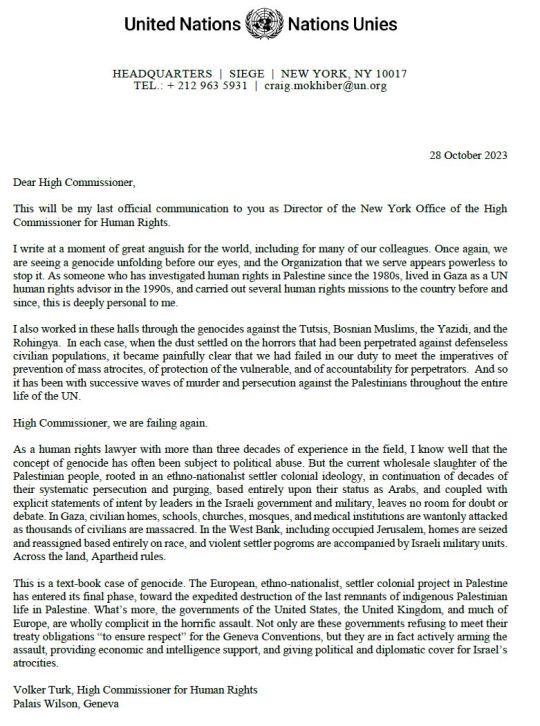
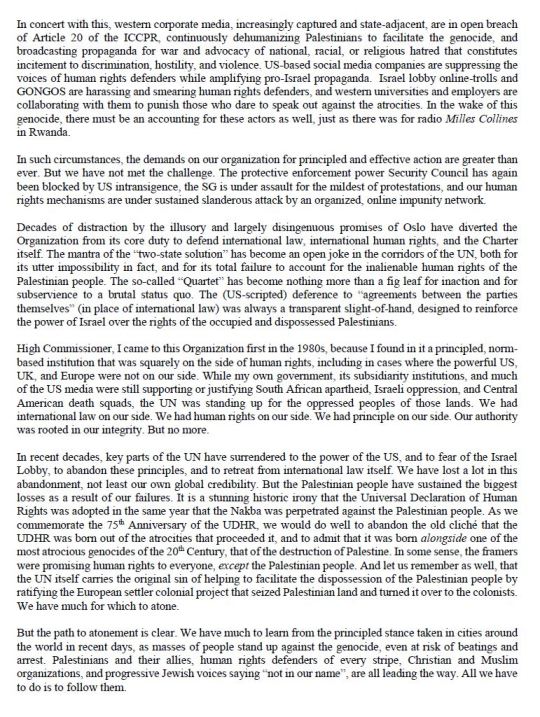
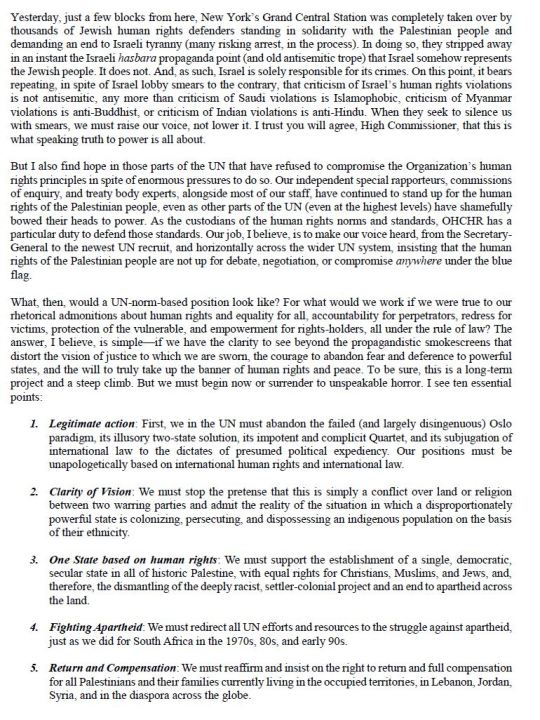
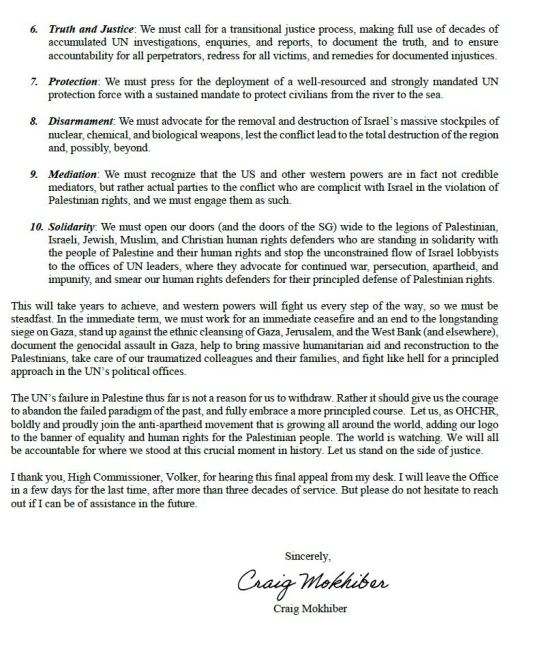
Transcription:
United Nations | Nations Unies
HEADQUARTERS I SIEGE I NEW YORK, NY 10017
28 October 2023
Dear High Commissioner,
This will be my last official communication to you as Director of the New York Office of the High Commissioner for Human Rights.
I write at a moment of great anguish for the world, including for many of our colleagues. Once again, we are seeing a genocide unfolding before our eyes, and the Organization that we serve appears powerless to stop it. As someone who has investigated human rights in Palestine since the 1980s, lived in Gaza as a UN human rights advisor in the 1990s, and carried out several human rights missions to the country before and since, this is deeply personal to me.
I also worked in these halls through the genocides against the Tutsis, Bosnian Muslims, the Yazidi, and the Rohingya. In each case, when the dust settled on the horrors that had been perpetrated against defenseless civilian populations, it became painfully clear that we had failed in our duty to meet the imperatives of prevention of mass atrocites, of protection of the vulnerable, and of accountability for perpetrators. And so it has been with successive waves of murder and persecution against the Palestinians throughout the entire life of the UN.
High Commissioner, we are failing again.
As a human rights lawyer with more than three decades of experience in the field, I know well that the concept of genocide has often been subject to political abuse. But the current wholesale slaughter of the Palestinian people, rooted in an ethno-nationalist settler colonial ideology, in continuation of decades of their systematic persecution and purging, based entirely upon their status as Arabs, and coupled with explicit statements of intent by leaders in the Israeli government and military, leaves no room for doubt or debate. In Gaza, civilian homes, schools, churches, mosques, and medical institutions are wantonly attacked as thousands of civilians are massacred. In the West Bank, including occupied Jerusalem, homes are seized and reassigned based entirely on race, and violent settler pogroms are accompanied by Israeli military units. Across the land, Apartheid rules.
This is a text-book case of genocide. The European, ethno-nationalist, settler colonial project in Palestine has entered its final phase, toward the expedited destruction of the last remnants of indigenous Palestinian life in Palestine. What's more, the governments of the United States, the United Kingdom, and much of Europe, are wholly complicit in the horrific assault. Not only are these governments refusing to meet their treaty obligations "to ensure respect" for the Geneva Conventions, but they are in fact actively arming the assault, providing economic and intelligence support, and giving political and diplomatic cover for Israel's atrocities.
Volker Turk, High Commissioner for Human Rights Palais Wilson, Geneva
In concert with this, western corporate media, increasingly captured and state-adjacent, are in open breach of Article 20 of the ICCPR, continuously dehumanizing Palestinians to facilitate the genocide, and broadcasting propaganda for war and advocacy of national, racial, or religious hatred that constitutes incitement to discrimination, hostility, and violence. US-based social media companies are suppressing the voices of human rights defenders while amplifying pro-Israel propaganda. Israel lobby online-trolls and GONGOS are harassing and smearing human rights defenders, and western universities and employers are collaborating with them to punish those who dare to speak out against the atrocities. In the wake of this genocide, there must be an accounting for these actors as well, just as there was for radio Mules Collins in Rwanda.
In such circumstances, the demands on our organization for principled and effective action are greater than ever. But we phave not met the challenge. The protective enforcement power Security Council has again been blocked by US intransigence, the SG [UN Secretary General] is under assault for the mildest of protestations, and our human rights mechanisms are under sustained slanderous attack by an organized, online impunity network.
Decades of distraction by the illusory and largely disingenuous promises of Oslo have diverted the Organization from its core duty to defend international law, international human rights, and the Charter itself. The mantra of the "two-state solution" has become an open joke in the corridors of the UN, both for its utter impossibility in fact, and for its total failure to account for the inalienable human rights of the Palestinian people. The so-called "Quartet" has become nothing more than a fig leaf for inaction and for subservience to a brutal status quo. The (US-scripted) deference to "agreements between the parties themselves" (in place of international law) was always a transparent slight-of-hand, designed to reinforce the power of Israel over the rights of the occupied and dispossessed Palestinians.
High Commissioner, I came to this Organization first in the 1980s, because I found in it a principled, norm-based institution that was squarely on the side of human rights, including in cases where the powerful US, UK, and Europe were not on our side. While my own government, its subsidiarity institutions, and much of the US media were still supporting or justifying South African apartheid, Israeli oppression, and Central American death squads, the UN was standing up for the oppressed peoples of those lands. We had international law on our side. We had human rights on our side. We had principle on our side. Our authority was rooted in our integrity. But no more.
In recent decades, key parts of the UN have surrendered to the power of the US, and to fear of the Israel Lobby, to abandon these principles, and to retreat from international law itself. We have lost a lot in this abandonment, not least our own global credibility. But the Palestinian people have sustained the biggest losses as a result of our failures. It is a stunning historic irony that the Universal Declaration of Human Rights was adopted in the same year that the Nakba was perpetrated against the Palestinian people. As we commemorate the 75th Anniversary of the UDHR, we would do well to abandon the old cliché that the UDHR was born out of the atrocities that proceeded it, and to admit that it was born alongside one of the most atrocious genocides of the 20th Century, that of the destruction of Palestine. In some sense, the framers were promising human rights to everyone, except the Palestinian people. And let us remember as well, that the UN itself carries the original sin of helping to facilitate the dispossession of the Palestinian people by ratifying the European settler colonial project that seized Palestinian land and turned it over to the colonists. We have much for which to atone.
But the path to atonement is clear. We have much to learn from the principled stance taken in cities around the world in recent days, as masses of people stand up against the genocide, even at risk of beatings and arrest. Palestinians and their allies, human rights defenders of every stripe, Christian and Muslim organizations, and progressive Jewish voices saying "not in our name", are all leading the way. All we have to do is to follow them.
Yesterday, just a few blocks from here, New York's Grand Central Station was completely taken over by thousands of Jewish human rights defenders standing in solidarity with the Palestinian people and demanding an end to Israeli tyranny (many risking arrest, in the process). In doing so, they stripped away in an instant the Israeli hasbara propaganda point (and old antisemitic trope) that Israel somehow represents the Jewish people. It does not. And, as such, Israel is solely responsible for its crimes. On this point, it bears repeating, in spite of Israel lobby smears to the contrary, that criticism of Israel's human rights violations is not antisemitic, any more than criticism of Saudi violations is Islamophobic, criticism of Myanmar violations is anti-Buddhist, or criticism of Indian violations is anti-Hindu. When they seek to silence us with smears, we must raise our voice, not lower it. I trust you will agree, High Commissioner, that this is what speaking truth to power is all about.
But I also find hope in those parts of the UN that have refused to compromise the Organization's human rights principles in spite of enormous pressures to do so. Our independent special rapporteurs, commissions of enquiry, and treaty body experts, alongside most of our staff, have continued to stand up for the human rights of the Palestinian people, even as other parts of the UN (even at the highest levels) have shamefully bowed their heads to power. As the custodians of the human rights norms and standards, OHCHR. has a particular duty to defend those standards. Our job, I believe, is to make our voice heard, from the Secretary-General to the newest UN recruit, and horizontally across the wider UN system, incisting that the human rights of the Palestinian people are not up for debate, negotiation, or compromise anywhere under the blue flag.
What, then, would a UN-norm-based position look like? For what would we work if we were true to our rhetorical admonitions about human rights and equality for all, accountability for perpetrators, redress for victims, protection of the vulnerable, and empowerment for rights-holders, all under the rule of law? The answer, I believe, is simple—if we have the clarity to see beyond the propagandistic smokescreens that distort the vision of justice to which we are sworn, the courage to abandon fear and deference to powerful states, and the will to truly take up the banner of human rights and peace. To be sure, this is a long-term project and a steep climb. But we must begin now or surrender to unspeakable horror. I see ten essential points:
Legitimate action: First, we in the UN must abandon the failed (and largely disingenuous) Oslo paradigm, its illusory two-state solution, its impotent and complicit Quartet, and its subjugation of international law to the dictates of presumed political expediency. Our positions must be unapologetically based on international human rights and international law.
Clarity of Vision: We must stop the pretense that this is simply a conflict over land or religion between two warring parties and admit the reality of the situation in which a disproportionately powerful state is colonizing, persecuting, and dispossessing an indigenous population on the basis of their ethnicity.
One State based on human rights: We must support the establishment of a single, democratic, secular state in all of historic Palestine, with equal rights for Christians, Muslims, and Jews, and, therefore, the dicmantling of the deeply racist, settler-colonial project and an end to apartheid across the land.
Fighting Apartheid: We must redirect all UN efforts and resources to the struggle against apartheid, just as we did for South Africa in the 1970s, 80s, and early 90s.
Return and Compensation: We must reaffirm and insist on the right to return and full compensation for all Palestinians and their families currently living in the occupied territories, in Lebanon, Jordan, Syria, and in the diaspora across the globe.
Truth and Justice: We must call for a transitional justice process, making full use of decades of accumulated UN investigations, enquiries, and reports, to document the truth, and to ensure accountability for all perpetrators, redress for all victims, and remedies for documented injustices.
Protection: We must press for the deployment of a well-resourced and strongly mandated UN protection force with a sustained mandate to protect civilians from the river to the sea.
Disarmament: We must advocate for the removal and destruction of Israel's massive stockpiles of nuclear, chemical, and biological weapons, lest the conflict lead to the total destruction of the region and, possibly, beyond.
Mediation: We must recognize that the US and other western powers are in fact not credible mediators, but rather actual parties to the conflict who are complicit with Israel in the violation of Palestinian rights, and we must engage them as such.
Solidarity: We must open our doors (and the doors of the SG) wide to the legions of Palestinian, Israeli, Jewish, Muslim, and Christian human rights defenders who are standing in solidarity with the people of Palestine and their human rights and stop the unconstrained flow of Israel lobbyists to the offices of UN leaders, where they advocate for continued war, persecution, apartheid, and impunity, and smear our human rights defenders for their principled defense of Palestinian rights.
This will take years to achieve, and western powers will fight us every step of the way, so we must be steadfast. In the immediate term, we must work for an immediate ceasefire and an end to the longstanding siege on Gaza, stand up against the ethnic cleansing of Gaza, Jerusalem, and the West Bank (and elsewhere), document the genocidal assault in Gaza, help to bring massive humanitarian aid and reconstruction to the Palestinians, take care of our traumatized colleagues and their families, and fight like hell for a principled approach in the UN's political offices.
The UN's failure in Palestine thus far is not a reason for us to withdraw. Rather it should give us the courage to abandon the failed paradigm of the past, and fully embrace a more principled course. Let us, as OHCHR, boldly and proudly join the anti-apartheid movement that is growing all around the world, adding our logo to the banner of equality and human rights for the Palestinian people. The world is watching. We will all be accountable for where we stood at this crucial moment in history. Let us stand on the side of justice.
I thank you, High Commissioner, Volker, for hearing this final appeal from my desk. I will leave the Office in a few days for the last time, after more than three decades of service. But please do not hesitate to reach out if I can be of assistance in the future.
Sincerely,
Craig Mokhiber
End of transcription.
Emphasis (bolding) is my own. I have added links, where relevant, to explanations of concepts the former Director refers to.
#Israel#Palestine#October 2023#28 October 2023#United Nations#Described#Long post#I’ll add more links to the things he is talking about later
15K notes
·
View notes
Text
a year ago, i was celebrating simchat torah when my rabbi interrupted the services to let us know there had been an attack on israel. we didn’t know how bad yet, but we prayed everything would be alright. the rest of the service went on as planned, but there was a chill in the air, like we knew something had changed. something big. but we didn’t quite understand it yet.
a year ago, i watched people i’d followed for years celebrate a gruesome massacre of over a thousand human beings before we even really knew what had happened. i watched anons pour into my inbox, demanding i condemn israel even though israel hadn’t even retaliated yet.
a year ago, i talked to my nonna on facetime for her birthday. she was in her 90s and wasn’t as present anymore, and i could barely focus because my thoughts were thousands of miles away. i promised her i’d call her the next day but my next day became scrolling past horrific photos and videos i didn’t want to see, posts celebrating the attacks, posts telling people that if they didn’t celebrate the attacks that they were bad people. she died two weeks later and the same people sharing the posts celebrating the massacre sent me messages telling me it was good my nonna was dead, or extremely crude and disgusting messages about what they wanted to do to her dead body because she was “probably a zionist.”
a year ago, i worked at a synagogue that started getting dozens of calls and emails from people, across the spectrum from neo nazis to evangelical christians to radical leftists saying the most horrific things, telling us it was our fault, that we had to do something, that it was on us. we were responsible. an anon told me i was a zionist because i had a zionist language on my blog (hebrew) and worked at a zionist institution (synagogue).
a year ago, i started losing friends one by one after many of them started to share posts justifying or celebrating the massacre or memes created by neo nazis, some of which didn’t even bother to sub out “jews” for “zionists” but they shared them anyway. i was pushed out of an activist group after months of begging them to stop using antisemitic language because i had the audacity to tell a white gentile in the group not to say racist things about a black indigenous jew behind her back, and said gentile told me he didn’t have to listen to me and that he could “claim” the holocaust too because his ancestors were from eastern europe.
a year ago, i watched in real time as the world i thought i knew, the world in which jews had a future and safety in the united states, crumbled day after day. people that previously went out of their way to take care of me and support me decided that because i didn’t feel comfortable marching alongside pictures of hitler i must be a zionist and therefore no longer belonged. the person processing my government aid didn’t want to approve me because i worked for a synagogue part time and argued that the synagogue should just pay me more because “they can afford it.” my synagogue, which has been involved in social justice since its founding several decades ago, along with its rabbis who have been just as involved, were abandoned by the communities they had put their blood, sweat, and tears into advocating for when they had the audacity to grieve for the dead of october 7th.
a year ago, i learned the hard way that we are not special in this time. antisemitism is a river that has ebbed and flowed for thousands of years, and i felt like a fool for thinking a dam could be built overnight.
a lot of people say that every day of this year for them has been october 7th, but for me every day has been october 8th. the day after the initial shock, when reality started to sink in. the realization that all the people who had shared “happy rosh hashanah” posts or complimented my kippah or pretended to care about harry potter goblins were quickly dropping the facade. that my token minority card had expired and now having a jew in their group didn’t look diverse, it looked “sympathetic toward israel.” every day has been a painful reminder that no one else is grieving like we are, and a large number of those people are angry that we are grieving. they don’t understand that we’re not just grieving the lives lost and the hostages. we’re grieving for the world we thought we knew, a world where we might have a chance to thrive like we did in the golden age of spain. but those golden years are ending. and that is one of the things we are grieving.
a lot of people also say that they wish they could go back to who they were on october 6th, but i don’t. i’m glad the illusion was shattered, that i can see more clearly who will stand with jews even if they face backlash, who will challenge their antisemitic biases and do the hard work to unlearn them, and who did not have to be asked twice to share literal nazi rhetoric if it meant feeling like a hero. i’m glad the masks are coming off because it means you can’t gaslight us anymore and tell us it’s all in our heads. we can see you for exactly who you are now. and we will not let you break us.
i don’t want to be living forever in october. i don’t want the blissful ignorance of october 6th, but i also don’t want the bitter anger of october 8th. i want to stand up for what i believe in, to celebrate my culture and my people, and no amount of intimidation or harassment will keep me from loving my jewishness. you have shown me i can no longer live in october 6th, but i refuse to let you keep me in october 8th.
1K notes
·
View notes
Text
"Native Americans across Indian Country shared mixed emotions this week after President Biden apologized for the U.S. government’s role in running Native American boarding schools across the country.
During the 150-year practice, at more than 400 schools where the U.S. partnered with various religious institutions, Indigenous children were separated from their families and stripped of their language and customs in an effort to assimilate into white culture. There were also documented cases of abuse and death.
Secretary of the Interior Deb Haaland, who is a member of the Laguna Pueblo tribe and has been instrumental in bringing these issues to a wider audience through her Federal Indian Boarding School Initiative, applauded Biden’s move.
“I'm so grateful to [Biden] for acknowledging this terrible era of our nation's past,” Haaland, whose grandparents were taken to boarding schools, posted on X.
ederal Indian boarding schools have impacted every Indigenous person I know. These were places where children - including my grandparents - were traumatized. I'm so grateful to @POTUS for acknowledging this terrible era of our nation's past.
“I would never have guessed in a million years that something like this would happen,” she told the Associated Press.
At the Gila Crossing Community School near Phoenix, Biden celebrated Haaland’s historic role and apologized today for America’s “sin.”
“It’s an honor, a genuine honor … to right a wrong, to chart a new path,” he said. “I formally apologize as president of the United States of America for what we did. I formally apologize. It’s long overdue.”
However, Indigenous leaders and citizens across the country stressed that this is only the first step.
“This is one of the most historic days in the history of Indian Country, and an apology of this size must be followed by real action,” Nick Tilsen, who belongs to the Oglala Lakota Nation and is president and CEO of the Indigenous rights organization NDN Collective, told Yahoo News.
Tilsen believes that there are specific, actionable steps that need to accompany any apology. For him, that means passing the U.S. Truth and Healing Commission bill in Congress, rescinding medals of honor for those who participated in the Battle of Wounded Knee, releasing “longest living Indigenous political prisoner in American history Leonard Peltier, who is also a boarding school survivor” and “unprecedented investment in Indigenous languages and education.”
Principal Chief of the Cherokee Nation Chuck Hoskin celebrated the move, calling out Haaland’s role in particular, and echoed the sentiment of following any apology with action.
“The [Department of the Interior’s] recommendations, especially in the preservation of Native languages and the repatriation of ancestors and cultural items, can be a path toward true healing,” Hoskin said in a statement.
While many Indigenous leaders are calling for action, Tilsen stressed that this is also a time to hold boarding school survivors and their families close.
“At this moment in history, we have to remember many of the survivors of the boarding schools are still alive,” he said. “It's in every household and it's in every community. And it's directly tied to the struggles that our people have today.”
Dylan Rose Goodwill, who is Diné (Navajo), Hunkpapa Lakota and Sisseton Wahpeton Dakota, was visiting Sherman Indian High School in Riverside, Calif., on Thursday when she heard the news about Biden’s forthcoming apology. It’s a place that is part of her family history, as her grandmother (or másáni) was sent there when it served as a federally run Native boarding school.
She told Yahoo News that hearing the news there was “complicated.”
As the senior assistant director of undergraduate admissions at the University of Southern California, Goodwill was visiting the school as a college recruiter.
“I've always had these kinds of mixed feelings because it's been weird to be the admission counselor for the schools that my own grandparents attended,” she said.
“It was already a tough morning to go and then to receive the news on site was really a mixture of feelings because I felt anger mostly, where it was like disbelief that this was happening, excitement that at least it was happening, but also feeling like this isn't enough,” Goodwill added.
Sitting where her grandmother sat in the 1930s and '40s, Goodwill asked herself, “What is that gonna really hold for her now? She passed in '04.”
Biden’s statement comes 16 years after former Canadian Prime Minister Stephen Harper apologized for Canada’s role in the Indigenous residential school system — a topic filmmakers Julian Brave NoiseCat and Emily Kassie document in their film Sugarcane, about St. Joseph’s Mission School near the Sugarcane reserve in British Columbia.
NoiseCat is a member of the Canim Lake Band Tsq’escen and a descendant of the Lil’wat Nation of Mount Currie and whose grandmother attended the Catholic Church-run residential school and gave birth to his father there. He told Yahoo News that this moment was important for a “continentwide conversation about what happened to Native families and Native children at Native American boarding schools and Indian residential schools.”
Joining Biden and Haaland for the event on the Gila River Indian Reservation along with Kassie, NoiseCat continued, “The fact that the president has chosen to formally apologize to survivors and their families is a real testament to the significance of this story, which needs to be understood as a foundational story to North America.”
However, Kassie echoed that actionable steps must follow sentiment.
“As momentous and important as this day is, it's important that it's followed up with action,” she told Yahoo. “It's important that the records of what happened at these institutions that are held by the U.S. government and the Catholic Church are opened to Indigenous communities who are looking for answers. And it's important that those communities also have the opportunity to hold to account those institutions and individuals who abused them.”
For Tilsen, it’s also a time to “center the survivors.”
“As we sort of politically dissect this moment,” he said, “I also want to recognize the pain that is being resurfaced, and that our people deserve the right to have pain and they deserve the right to have rage in this moment while we lean towards moving forward in action.”
NoiseCat, who has a deeply personal connection to the residential school history, said, “I'm probably going to call my dad today after the apology and just check in with him.”
369 notes
·
View notes
Text
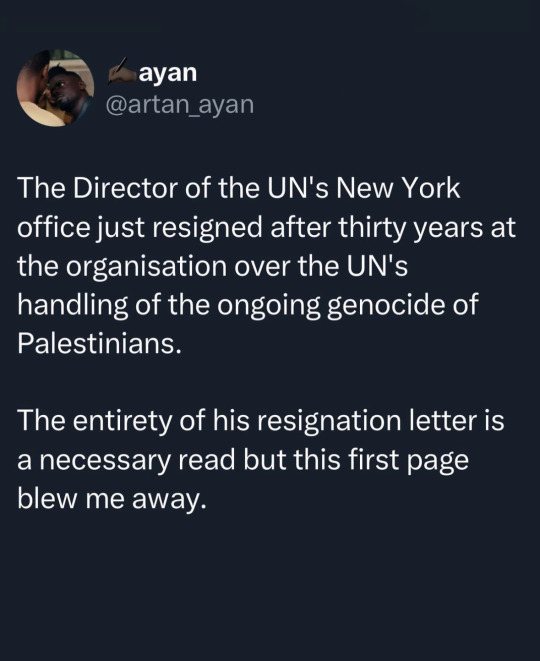
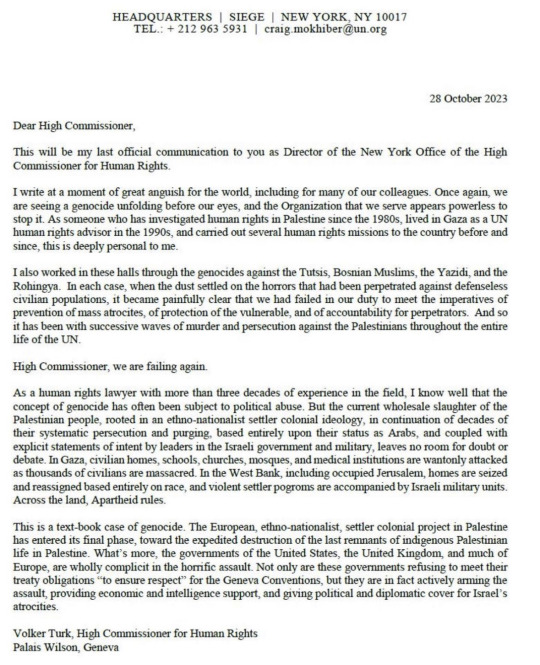
Dear High Commissioner,
This will be my last official communication to you as Director of the New York Office of the High Commissioner for Human Rights.
I write at a moment of great anguish for the world, including for many of our colleagues. Once again, we are seeing a genocide unfolding before our eyes, and the Organization that we serve appears powerless to stop it. As someone who has investigated human rights in Palestine since the 1980s, lived in Gaza as a UN human rights advisor in the 1990s, and carried out several human rights missions to the country before and since, this is deeply personal to me.
I also worked in these halls through the genocides against the Tutsis, Bosnian Muslims, the Yazidi, and the Rohingya. In each case, when the dust settled on the horrors that had been perpetrated against defenseless civilian populations, it became painfully clear that we had failed in our duty to meet the imperatives of prevention of mass atrocites, of protection of the vulnerable, and of accountability for perpetrators. And so it has been with successive waves of murder and persecution against the Palestinians throughout the entire life of the UN.
High Commissioner, we are failing again.
As a human rights lawyer with more than three decades of experience in the field, I know well that the concept of genocide has often been subject to political abuse. But the current wholesale slaughter of the Palestinian people, rooted in an ethno-nationalist settler colonial ideology, in continuation of decades of their systematic persecution and purging, based entirely upon their status as Arabs, and coupled with explicit statements of intent by leaders in the Israeli government and military, leaves no room for doubt or debate. In Gaza, civilian homes, schools, churches, mosques, and medical institutions are wantonly attacked as thousands of civilians are massacred. In the West Bank, including occupied Jerusalem, homes are seized and reassigned based entirely on race, and violent settler pogroms are accompanied by Israeli military units. Across the land, Apartheid rules.
This is a textbook case of genocide. The European, ethno-nationalist, settler colonial project in Palestine has entered its final phase, toward the expedited destruction of the last remnants of indigenous Palestinian life in Palestine. What's more, the governments of the United States, the United Kingdom, and much of Europe, are wholly complicit in the horrific assault. Not only are these governments refusing to meet their treaty obligations "to ensure respect" for the Geneva Conventions, but they are in fact actively arming the assault, providing economic and intelligence support, and giving political and diplomatic cover for Israel's atrocities.
Volker Turk, High Commissioner for Human Rights Palais Wilson, Geneva
Full letter
2K notes
·
View notes
Text
Excerpt from this story from The Revelator:
When Kathryn Parsley taught biology to undergrads, she sometimes talked about Australia’s stinging tree, which is among the world’s most venomous plants — and can cause months of excruciating pain for anyone who approaches it.
“It’s incredibly dangerous,” she says. “If you even get close, its trichomes can get on you and it feels like your skin is on fire.” The sensation has been compared to being burned with hot acid and electrocuted at the same time.
The stinging tree got her students’ attention, and that was Parsley’s aim. Many people consider plants benign and boring, if they consider them at all. Most plants don’t exist for them as distinct species; instead they compose what some botanists call “a green curtain”— a generic backdrop for more interesting creatures, namely animals, preferably vertebrates, ultimately humans.
Parsley wrote her dissertation on the subject of plant blindness, a term coined in 1999 by American botanists James Wandersee and Elisabeth Schussler, who defined it as “the inability to see or notice the plants in one’s own environment.”
Several studies — including one Parsley conducted — have documented a difference in the visual attention people pay to animals compared to plants. When shown images in rapid succession, university students were better able to detect the animals and recalled more animal than plant names. There’s even evidence that some students didn’t perceive plants as being alive.
Because of its reference to vision, Parsley considers the term “plant blindness” ableist and suggests the term plant awareness disparity instead. It has also been called zoochauvinism and zoocentrism.
Whatever you call it, many people find plants unworthy of their consideration. Yet in terms of sheer volume, plants dwarf the rest of life on Earth’s surface. Plant biomass is estimated to be 450 gigatons on land, while animals account for only 2 gigatons. Plant-blind humans simply discard most of the plant information their eye-brain systems take in, processing information about something else instead.
Wandersee and Schussler attributed some of that apathy to the fact that plants, unlike animals, don’t have a face. Nor can they move or threaten us in the way animals can. But while these plant traits have been fairly constant over time, experts think plant blindness is on the rise.
So if plants haven’t changed, why have we?
As it turns out, we haven’t all changed. The rate of plant blindness varies across cultures. Most of the research on it has been done in the United States and United Kingdom, whereas “Indigenous people are very plant-oriented,” Parsley points out. “Some subcultures in the U.S. and outside the U.S. are very plant-oriented.”
It wasn’t that long ago that many people in Eurocentric cultures revered plants, too. But our relationship with plants has changed. Two hundred years ago, most people lived on farms. They grew and gathered their own food, so they had to know plants. Today most of us live in cities and towns. We don’t rely on our plant-identification skills in order to eat.
283 notes
·
View notes
Text
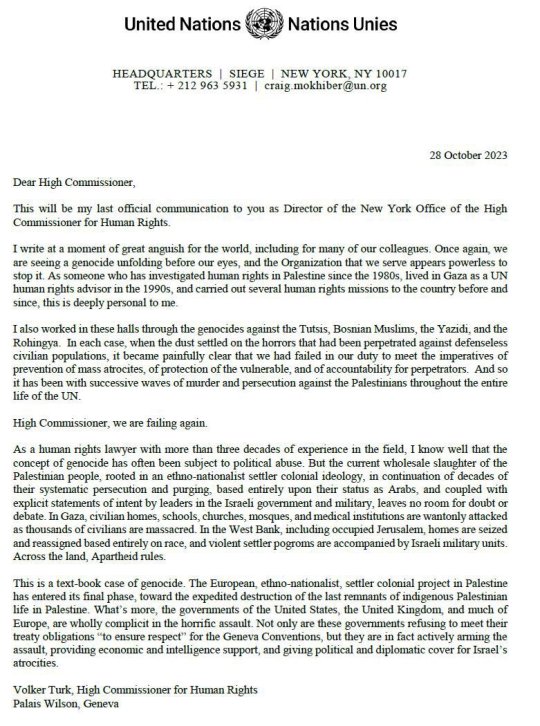
You MUST READ and disseminate the resignation letter of the High Commissioner for Human Rights, which speaks of a comprehensive plan for annihilation/genocide.
This resignation letter and message were written three days before the Jabaliya Massacre, in which many children and women tragically lost their lives!
You can read it from the image, or I will provide you with the text below to make it easier for you to read.
28 October 2023 Dear High Commissioner, This will be my last official communication to you as Director of the New York Office of the High Commissioner for Human Rights. I write at a moment of great anguish for the world, including for many of our colleagues. Once again, we are seeing a genocide unfolding before our eyes, and the Organization that we serve appears powerless to stop it. As someone who has investigated human rights in Palestine since the 1980s, lived in Gaza as a UN human rights advisor in the 1990s, and carried out several human rights missions to the country before and since, this is deeply personal to me. I also worked in these halls through the genocides against the Tutsis, Bosnian Muslims, the Yazidi, and the Rohingya. In each case, when the dust settled on the horrors that had been perpetrated against defenseless civilian populations, it became painfully clear that we had failed in our duty to meet the imperatives of prevention of mass atrocites, of protection of the vulnerable, and of accountability for perpetrators. And so it has been with successive waves of murder and persecution against the Palestinians throughout the entire life of the UN. High Commissioner, we are failing again. As a human rights lawyer with more than three decades of experience in the field, I know well that the concept of genocide has often been subject to political abuse. But the current wholesale slaughter of the Palestinian people, rooted in an ethno-nationalist settler colonial ideology, in continuation of decades of their systematic persecution and purging, based entirely upon their status as Arabs, and coupled with explicit statements of intent by leaders in the Israeli government and military, leaves no room for doubt or debate. In Gaza, civilian homes, schools, churches, mosques, and medical institutions are wantonly attacked as thousands of civilians are massacred. In the West Bank, including occupied Jerusalem, homes are seized and reassigned based entirely on race, and violent settler pogroms are accompanied by Israeli military units. Across the land, Apartheid rules. This is a text-book case of genocide. The European, ethno-nationalist, settler colonial project in Palestine has entered its final phase, toward the expedited destruction of the last remnants of indigenous Palestinian life in Palestine. What's more, the governments of the United States, the United Kingdom, and much of Europe, are wholly complicit in the horrific assault. Not only are these governments refusing to meet their treaty obligations to ensure respect" for the Geneva Conventions, but they are in fact actively arming the assault, providing economic and intelligence support, and giving political and diplomatic cover for Israel's atrocities. Volker Turk, High Commissioner for Human Rights Palais Wilson, Geneva
#gaza#palestine#gaza strip#free gaza#free palestine#storiesfromgaza#غزة#فلسطين#genocide#humanitarian crisis
1K notes
·
View notes
Text
"The U.S. government is entering a new era of collaboration with Native American and Alaska Native leaders in managing public lands and other resources, with top federal officials saying that incorporating more Indigenous knowledge into decision-making can help spur conservation and combat climate change.
Federal emergency managers on Thursday also announced updates to recovery policies to aid tribal communities in the repair or rebuilding of traditional homes or ceremonial buildings after a series of wildfires, floods and other disasters around the country.
With hundreds of tribal leaders gathering in Washington this week for an annual summit, the Biden administration is celebrating nearly 200 new agreements that are designed to boost federal cooperation with tribes nationwide.
The agreements cover everything from fishery restoration projects in Alaska and the Pacific Northwest to management of new national monuments in the Southwestern U.S., seed collection work in Montana and plant restoration in the Great Smoky Mountains.
“The United States manages hundreds of millions of acres of what we call federal public lands. Why wouldn’t we want added capacity, added expertise, millennia of knowledge and understanding of how to manage those lands?” U.S. Interior Assistant Secretary Bryan Newland said during a panel discussion.
The new co-management and co-stewardship agreements announced this week mark a tenfold increase over what had been inked just a year earlier, and officials said more are in the pipeline.
Newland, a citizen of the Bay Mills Indian Community in northern Michigan, said each agreement is unique. He said each arrangement is tailored to a tribe’s needs and capacity for helping to manage public lands — and at the very least assures their presence at the table when decisions are made.
The federal government is not looking to dictate to tribal leaders what a partnership should look like, he said...
The U.S. government controls more than a quarter of the land in the United States, with much of that encompassing the ancestral homelands of federally recognized tribes...
Tribes and advocacy groups have been pushing for arrangements that go beyond the consultation requirements mandated by federal law.
Researchers at the University of Washington and legal experts with the Native American Rights Fund have put together a new clearinghouse on the topic. They point out that public lands now central to the country’s national heritage originated from the dispossession and displacement of Indigenous people and that co-management could present on opportunity for the U.S. to reckon with that complicated legacy...
In an attempt to address complaints about chronic underfunding across Indian Country, President Joe Biden on Wednesday signed an executive order on the first day of the summit that will make it easier for tribes to find and access grants.
Deanne Criswell, administrator of the Federal Emergency Management Agency, told tribal leaders Thursday that her agency [FEMA] began work this year to upgrade its disaster guidance particularly in response to tribal needs.
The Indigenous people of Hawaii have increasingly been under siege from disasters, most recently a devastating fire that killed dozens of people and leveled an entire town. Just last month, another blaze scorched a stretch of irreplaceable rainforest on Oahu.
Tribes in California and Oregon also were forced to seek disaster declarations earlier this year after severe storms resulted in flooding and mudslides...
Criswell said the new guidance includes a pathway for Native American, Alaska Native and Hawaiian communities to request presidential disaster declarations, providing them with access to emergency federal relief funding. [Note: This alone is potentially a huge deal. A presidential disaster declaration unlocks literally millions of dollars in federal aid and does a lot to speed up the response.]
The agency also is now accepting tribal self-certified damage assessments and cost estimates for restoring ceremonial buildings or traditional homes, while not requiring site inspections, maps or other details that might compromise culturally sensitive data."
-via AP, December 7, 2023
#united states#us politics#natural disasters#disaster relief#public lands#land back#indigenous#native american#first nations#indigineous people#sovereignty#president biden#biden administration#hope#good news#land management
596 notes
·
View notes
Text
About the entanglement of "science" and Empire. About geographic imaginaries. About how Empire appeals to and encourages children to participate in these scripts.
Was checking out this recent thing, from scavengedluxury's beloved series of posts looking at the archive of the Budapest Municipal Photography Company.

The caption reads: "Toys and board games, 1940."
And I think the text on the game-box in the back says something like "the whole world is yours", maybe?
(The use of appeals to science/progress in imperial narratives probably already well-known to many, especially for those familiar with Victorian era, Edwardian era, Gilded Age, early twentieth century, etc., in US and Europe.)
And was struck, because I had also recently gone looking through nemfrog's posts about the often-strange imagery of children's material in late nineteenth- and early twentieth-century US/Europe. And was disturbed/intrigued by this thing:
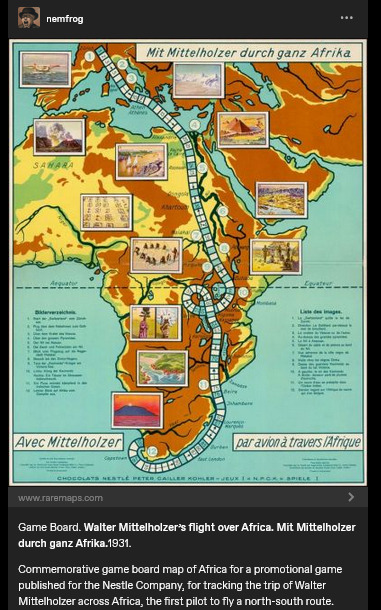
Caption here reads: "Game Board. Walter Mittelholzer's flight over Africa. [...] 1931. Commemorative game board map of Africa for a promotional game published for the N*stle Company, for tracking the trip of Walter Mittelholzer across Africa, the first pilot to fly a north-south route."
Hmm.
"Africa is for your consumption and pleasure! A special game celebrating German achievement, brought to you by the N*stle Company!"
1930s-era German national aspirations in Africa. A company which, in the preceding decade, had shifted focus to expand its cacao production (which would be dependent on tropical plantations). Adventure, excitement, knowledge, science, engineering prowess, etc. For kids!
Another, from a couple decades earlier, this time British.
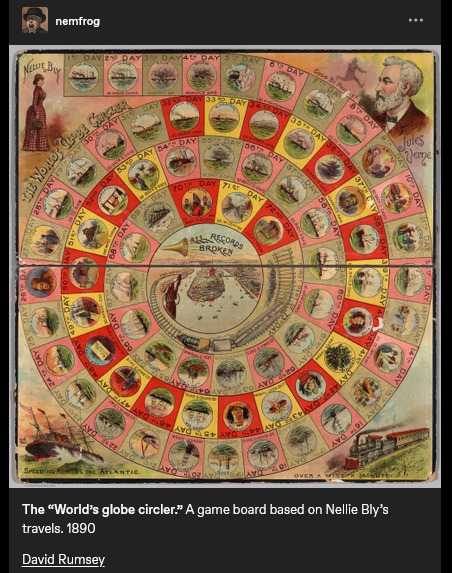
Caption reads: "The "World's globe circler." A game board based on Nellie Bly's travels. 1890." At center, a trumpet, and a proclamation: "ALL RECORDS BROKEN".
Same year that the United States "closed the frontier" and conquered "the Wild West" (the massacre at Wounded Knee happened in December 1890). A couple years later, the US annexed Hawai'i; by decade's end, the US military was in both Cuba and the Philippines. The Scramble for Africa was taking place. At the time, Britain especially already had a culture of "travel writing" or "travel fiction" or whatever we want to call it, wherein domestic residents of the metropole back home could read about travel, tourism, expeditions, adventures, etc. on the peripheries of the Empire. Concurrent with the advent of popular novels, magazines, mass-market print media, etc. Intrepid explorers rescuing Indigenous peoples from their own backwardness. Many tales of exotic allure set in South Asia. Heroic white hunters taking down scary tigers. Elegant Englishwomen sipping tea in the shade of an umbrella, giggling at the elephants, the local customs, the strange sights. Orientalism, tropicality, othering.
I'd lately been looking at a lot of work on race/racism and imperative-of-empire in British scientific and pop-sci literature, especially involving South and Southeast Asia. (From scholars like Varun Sharma, Rohan Deb Roy, Ezra Rashkow, Jonathan Saha, Pratik Chakrabarti.) But I'd also lately been looking at Mashid Mayar's work, which I think closely suits this kinda thing with the board games. Some of her publications:
"From Tools to Toys: American Dissected Maps and Geographic Knowledge at the Turn of the Twentieth Century". In: Knowledge Landscapes North America, edited by Kloeckner et al., 2016.
"What on Earth! Slated Globes, School Geography and Imperial Pedagogy". European Journal of American Studies 16, number 3, Summer 2020.
Citizens and Rulers of the World: The American Child and the Cartographic Pedagogies of Empire, 2022.
Discussing her book, Mayar was interviewed by LA Review of Books in 2022. She says:
[Quote.] Growing up at the turn of the 20th century, for many American children, also meant learning to view the world through the lens of "home geography." [...] [T]hey inevitably responded to the transnational whims of an empire that had stretched its dominion across the globe [recent forays into Panama, Cuba, Hawai'i, the Philippines] [...]. [W]hite, well-to-do, literate American children [...] learned how to identify and imagine “homes” on the map of the world. [...] [T]he cognitive maps children developed, to which we have access through the scant archival records they left behind (i.e., geographical puzzles they designed and printed in juvenile periodicals) [...] mixed nativism and the logic of colonization with playful, appropriative scalar confusion, and an intimate, often unquestioned sense of belonging to the global expanse of an empire [...]. Dissected maps - that is, maps mounted on cardboard or wood and then cut into smaller pieces that children were to put back together - are a generative example of the ways imperial pedagogy [...] found its place outside formal education, in children's lives outside the classroom. [...] [W]ell before having been adopted as playthings in the United States, dissected maps had been designed to entertain and teach the children of King George III about the global spatial affairs of the British Empire. […] [J]uvenile periodicals of the time printed child-made geographical puzzles [...]. [I]t was their assumption that "(un)charted," non-American spaces (both inside and outside the national borders) sought legibility as potential homes, [...] and that, if they did not do so, they were bound to recede into ruin/"savagery," meaning that it would become the colonizers' responsibility/burden to "restore" them [...]. [E]mpires learn from and owe to childhood in their attempts at survival and growth over generations [...]. [These] "multigenerational power constellations" [...] survived, by making accessible pedagogical scripts that children of the white and wealthy could learn from and appropriate as times changed [...]. [End quote.] Source: Words of Mashid Mayar, as transcribed in an interviewed conducted and published by M. Buna. "Children's Maps of the American Empire: A Conversation with Mashid Mayar". LA Review of Books. 11 July 2022.
Some other stuff I was recently looking at, specifically about European (especially German) geographic imaginaries of globe-as-playground:
The Play World: Toys, Texts, and the Transatlantic German Childhood (Patricia Anne Simpson, 2020) /// "19th-Century Board Game Offers a Tour of the German Colonies" (Sarah Zabrodski, 2016) /// Advertising Empire: Race and Visual Culture in Imperial Germany (David Ciarlo, 2011) /// Learning Empire: Globalization and the German Quest for World Status, 1875-1919 (Erik Grimmer-Solem, 2019) /// “Ruling Africa: Science as Sovereignty in the German Colonial Empire and Its Aftermath” (Andrew Zimmerman. In: German Colonialism in a Global Age, 2014) /// "Exotic Education: Writing Empire for German Boys and Girls, 1884-1914". (Jeffrey Bowersox. In: German Colonialism and National Identity, 2017) /// Raising Germans in the Age of Empire: Youth and Colonial Culture, 1871-1914 (Jeff Bowersox, 2013) /// "[Translation:] (Educating Modernism: A Trade-Specific Portrait of the German Toy Industry in the Developing Mass-Market Society)" (Heike Hoffmann, PhD dissertation, Tubingen, 2000) /// Home and Harem: Nature, Gender, Empire, and the Cultures of Travel (Inderpal Grewal, 1996) /// "'Le rix d'Indochine' at the French Table: Representation of Food, Race and the Vietnamese in a Colonial-Era Board Game" (Elizabeth Collins, 2021) /// "The Beast in a Box: Playing with Empire in Early Nineteenth-Century Britain" (Romita Ray, 2006) /// Playing Oppression: The Legacy of Conquest and Empire in Colonialist Board Games (Mary Flanagan and Mikael Jakobsson, 2023)
#mashid mayar book is useful also the Playing Oppression book is open access online if you want#in her article on slated globes mayar also mentions how european maps by 1890s provoked a sort of replete homogenous filling in of globe#where european metropole thought of itself as having sufficiently mapped the planet by now knit into neat web of interimperial trade#and so european apparent knowledge of globe provided apparently enlightened position of educating or subjugating the masses#whereas US at time was more interested in remapping at their discretion#a thing which relates to what we were talking about in posts earlier today where elizabeth deloughrey describes twentieth century US#and its aerial photographic and satellite perspectives especially of Oceania and Pacific as if it now understood the totality of the planet#ecologies#tidalectics#geographic imaginaries#mashid mayar
133 notes
·
View notes
Text
Introduction To Supporting Sustainable Agriculture For Witches and Pagans

[ID: An image of yellow grain stocks, soon to be harvested. The several stocks reach towards a blurred open sky, focusing the camera on he grains themselves. The leaves of the grains are green and the cereals are exposed].
PAGANISM AND WITCHCRAFT ARE MOVEMENTS WITHIN A SELF-DESTRUCTIVE CAPITALIST SOCIETY. As the world becomes more aware of the importance of sustainability, so does the duty of humanity to uphold the idea of the steward, stemming from various indigenous worldviews, in the modern era. I make this small introduction as a viticulturist working towards organic and environmentally friendly grape production. I also do work on a food farm, as a second job—a regenerative farm, so I suppose that is my qualifications. Sustainable—or rather regenerative agriculture—grows in recognition. And as paganism and witchcraft continue to blossom, learning and supporting sustainability is naturally a path for us to take. I will say that this is influenced by I living in the USA, however, there are thousands of groups across the world for sustainable agriculture, of which tend to be easy to research.
So let us unite in caring for the world together, and here is an introduction to supporting sustainable/regenerative agriculture.
A QUICK BRIEF ON SUSTAINABLE AGRICULTURE
Sustainable agriculture, in truth, is a movement to practise agriculture as it has been done for thousands of years—this time, with more innovation from science and microbiology especially. The legal definition in the USA of sustainable agriculture is:
The term ”sustainable agriculture” (U.S. Code Title 7, Section 3103) means an integrated system of plant and animal production practices having a site-specific application that will over the long-term:
A more common man’s definition would be farming in a way that provides society’s food and textile needs without overuse of natural resources, artificial supplements and pest controls, without compromising the future generation’s needs and ability to produce resources. The agriculture industry has one of the largest and most detrimental impacts on the environment, and sustainable agriculture is the alternative movement to it.
Sustainable agriculture also has the perk of being physically better for you—the nutrient quality of crops in the USA has dropped by 47%, and the majority of our food goes to waste. Imagine if it was composted and reused? Or even better—we buy only what we need. We as pagans and witches can help change this.
BUYING ORGANIC (IT REALLY WORKS)
The first step is buying organic. While cliche, it does work: organic operations have certain rules to abide by, which excludes environmentally dangerous chemicals—many of which, such as DDT, which causes ecological genocide and death to people. Organic operations have to use natural ways of fertilising, such as compost, which to many of us—such as myself—revere the cycle of life, rot, and death. Organic standards do vary depending on the country, but the key idea is farming without artificial fertilisers, using organic seeds, supplementing with animal manure, fertility managed through management practices, etc.
However, organic does have its flaws. Certified organic costs many, of which many small farmers cannot afford. The nutrient quality of organic food, while tending to be better, is still poor compared to regeneratively grown crops. Furthermore, the process to become certified organic is often gruelling—you can practise completely organically, but if you are not certified, it is not organic. Which, while a quality control insurance, is both a bonus and a hurdle.
JOINING A CSA
Moving from organic is joining a CSA (“Community supported agriculture”). The USDA defines far better than I could:
Community Supported Agriculture (CSA), one type of direct marketing, consists of a community of individuals who pledge support to a farm operation so that the farmland becomes, either legally or spiritually, the community’s farm, with the growers and consumers providing mutual support and sharing the risks and benefits of food production.
By purchasing a farm share, you receive food from the farm for the agreed upon production year. I personally enjoy CSAs for the relational aspect—choosing a CSA is about having a relationship, not only with the farmer(s), but also the land you receive food from. I volunteer for my CSA and sometimes I get extra cash from it—partaking in the act of caring for the land. Joining a CSA also means taking your precious capital away from the larger food industry and directly supporting growers—and CSAs typically practise sustainable and/or regenerative agriculture.
CSAs are also found all over the world and many can deliver their products to food deserts and other areas with limited agricultural access. I volunteer from time to time for a food bank that does exactly that with the produce I helped grow on the vegetable farm I work for.
FARM MARKETS AND STALLS
Another way of personally connecting to sustainable agriculture is entering the realm of the farm stall. The farmer’s market is one of my personal favourite experiences—people buzzing about searching for ingredients, smiles as farmers sell crops and products such as honey or baked goods, etc. The personal connection stretches into the earth, and into the past it buries—as I purchase my apples from the stall, I cannot help but see a thousand lives unfold. People have been doing this for thousands of years and here I stand, doing it all over again.
Advertisement
Farmers’ markets are dependent on your local area, yet in most you can still develop personal community connections. Paganism often stresses community as an ideal and a state of life. And witchcraft often stresses a connection to the soil. What better place, then, is purchasing the products from the locals who commune with the land?
VOLUNTEERING
If you are able to, I absolutely recommend volunteering. I have worked with aquaponic systems, food banks, farms, cider-making companies, soil conservation groups, etc. There is so much opportunity—and perhaps employment—in these fields. The knowledge I have gained has been wonderful. As one example, I learned that fertilisers reduce carbon sequestration as plants absorb carbon to help with nutrient intake. If they have all their nutrients ready, they do not need to work to obtain carbon to help absorb it. This does not even get into the symbiotic relationship fungi have with roots, or the world of hyphae. Volunteering provides community and connection. Actions and words change the world, and the world grows ever better with help—including how much or how little you may provide. It also makes a wonderful devotional activity.
RESOURCING FOOD AND COOKING
Buying from farmers is not always easy, however. Produce often has to be processed, requiring labour and work with some crops such as carrots. Other times, it is a hard effort to cook and many of us—such as myself—often have very limited energy. There are solutions to this, thankfully:
Many farmers can and will process foods. Some even do canning, which can be good to stock up on food and lessen the energy inputs.
Value-added products: farms also try to avoid waste, and these products often become dried snacks if fruit, frozen, etc.
Asking farmers if they would be open to accommodating this. Chances are, they would! The farmer I purchase my CSA share from certainly does.
Going to farmers markets instead of buying a CSA, aligning with your energy levels.
And if any of your purchased goods are going unused, you can always freeze them.
DEMETER, CERES, VEIA, ETC: THE FORGOTTEN AGRICULTURE GODS
Agricultural gods are often neglected. Even gods presiding over agriculture often do not have those aspects venerated—Dionysos is a god of viticulture and Apollon a god of cattle. While I myself love Dionysos as a party and wine god, the core of him remains firmly in the vineyards and fields, branching into the expanses of the wild. I find him far more in the curling vines as I prune them than in the simple delights of the wine I ferment. Even more obscure gods, such as Veia, the Etruscan goddess of agriculture, are seldom known.
Persephone receives the worst of this: I enjoy her too as a dread queen, and people do acknowledge her as Kore, but she is far more popular as the queen of the underworld instead of the dear daughter of Demeter. I do understand this, though—I did not feel the might of Demeter and Persephone until I began to move soil with my own hands. A complete difference to the ancient world, where the Eleusinian mysteries appealed to thousands. Times change, and while some things should be left to the past, our link to these gods have been severed. After all, how many of us reading know where our food comes from? I did not until I began to purchase from the land I grew to know personally. The grocery store has become a land of tearing us from the land, instead of the food hub it should be.
Yet, while paganism forgets agriculture gods, they have not forgotten us. The new world of farming is more conductive and welcoming than ever. I find that while older, bigoted people exist, the majority of new farmers tend to be LGBT+. My own boss is trans and aro, and I myself am transgender and gay. The other young farmers I know are some flavour of LGBT+, or mixed/poc. There’s a growing movement for Black farmers, elaborated in a lovely text called We Are Each Other’s Harvest.
Indigenous farming is also growing and I absolutely recommend buying from indigenous farmers. At this point, I consider Demeter to be a patron of LGBT+ people in this regard—she gives an escape to farmers such as myself. Bigotry is far from my mind under her tender care, as divine Helios shines above and Okeanos’ daughters bring fresh water to the crops. Paganism is also more commonly accepted—I find that farmers find out that I am pagan and tell me to do rituals for their crops instead of reacting poorly. Or they’re pagan themselves; a farmer I know turned out to be Wiccan and uses the wheel of the year to keep track of production.
Incorporating these divinities—or concepts surrounding them—into our crafts and altars is the spiritual step towards better agriculture. Holy Demeter continues to guide me, even before I knew it.
WANT CHANGE? DO IT YOURSELF!
If you want change in the world, you have to act. And if you wish for better agriculture, there is always the chance to do it yourself. Sustainable agriculture is often far more accessible than people think: like witchcraft and divination, it is a practice. Homesteading is often appealing to many of us, including myself, and there are plenty of resources to begin. There are even grants to help one improve their home to be more sustainable, i.e. solar panels. Gardening is another, smaller option. Many of us find that plants we grow and nourish are far more potentant in craft, and more receptive to magical workings.
Caring for plants is fundamental to our natures and there are a thousand ways to delve into it. I personally have joined conservation groups, my local soil conservation group, work with the NRCs in the USA, and more. The path to fully reconnecting to nature and agriculture is personal—united in a common cause to fight for this beautiful world. To immerse yourself in sustainable agriculture, I honestly recommend researching and finding your own path. Mine lies in soil and rot, grapevines and fruit trees. Others do vegetables and cereal grains, or perhaps join unions and legislators. Everyone has a share in the beauty of life, our lives stemming from the land’s gentle sprouts.
Questions and or help may be given through my ask box on tumblr—if there is a way I can help, let me know. My knowledge is invaluable I believe, as I continue to learn and grow in the grey-clothed arms of Demeter, Dionysos, and Kore.
FURTHER READING:
Baszile, N. (2021). We are each other’s harvest. HarperCollins.
Hatley, J. (2016). Robin Wall Kimmerer. Braiding Sweetgrass: Indigenous wisdom, scientific knowledge and the teachings of plants. Environmental Philosophy, 13(1), 143–145. https://doi.org/10.5840/envirophil201613137
Regenerative Agriculture 101. (2021, November 29). https://www.nrdc.org/stories/regenerative-agriculture-101#what-is
And in truth, far more than I could count.
References
Community Supported Agriculture | National Agricultural Library. (n.d.). https://www.nal.usda.gov/farms-and-agricultural-production-systems/community-supported-agriculture
Navazio, J. (2012). The Organic seed Grower: A Farmer’s Guide to Vegetable Seed Production. Chelsea Green Publishing.
Plaster, E. (2008). Soil Science and Management. Cengage Learning.
Sheaffer, C. C., & Moncada, K. M. (2012). Introduction to agronomy: food, crops, and environment. Cengage Learning.
Sheldrake, M. (2020). Entangled life: How Fungi Make Our Worlds, Change Our Minds & Shape Our Futures. Random House.
Sustainable Agriculture | National Agricultural Library. (n.d.). https://www.nal.usda.gov/farms-and-agricultural-production-systems/sustainable-agriculture
#dragonis.txt#witchcraft#paganism#hellenic polytheism#witchblr#pagan#helpol#hellenic pagan#hellenic worship#hellenic paganism#hellenic polytheist#demeter deity#demeter worship#persephone deity#kore deity#raspol#etrupol#etruscan polytheist#etruscan polytheism#rasenna polytheism#rasenna polytheist#rasenna paganism
317 notes
·
View notes
Text
The Darién Gap was thought for centuries to be all but impassable. Explorers and would-be colonizers who entered tended to die of hunger or thirst, be attacked by animals, drown in fast-rising rivers, or simply get lost and never emerge. Those dangers remain, but in recent years the jungle has become a superhighway for people hoping to reach the United States. According to the United Nations, more than 800,000 may cross the Darién Gap this year—a more than 50 percent increase over last year’s previously unimaginable number. Children under 5 are the fastest-growing group. The U.S. has spent years trying to discourage this migration, pressuring its Latin American neighbors to close off established routes and deny visas to foreigners trying to fly into countries close to the U.S. border. Instead of stopping migrants from coming, this approach has simply rerouted them through the jungle, and shifted the management of their passage onto criminal organizations, which have eagerly taken advantage. The Gulf Clan, which now calls itself Ejército Gaitanista de Colombia, effectively controls this part of northern Colombia. It has long moved drugs and weapons through the Darién Gap; now it moves people too. Everyone who works in the Darién Gap must be approved by the cartel and hand over a portion of their earnings. They have built stairs into hillsides and outfitted cliffs with ladders and camps with Wi‑Fi. They advertise it all on TikTok and YouTube, and anyone can book a journey online. There are many paths through. The most grueling route is the cheapest—right now, about $300 a person to cross the jungle on foot. Taking a boat up the coast can cost more than $1,000.
[...] Guides and porters follow the migrants in the jungle with their iPhones rolling, asking, “Do you feel good?” and “Have we treated you well?” They film incessantly during the first day of walking, when people are still able to conjure a smile. (Even I ended up in one of their videos.) They post the videos on social media, selling trips across the jungle as if they were joyful nature walks. The profit motives of the cartel have become yet another factor fueling migration. [...] The porters we had paid to continue on with us told us to stay close together because bandits were thought to be intimidated by large groups. Later, we learned that was false—they were in fact targeting large groups, perhaps because it was more efficient than robbing a handful of people at a time. Our anxiety grew when we passed a couple of abandoned backpacks. We pushed through thicker and thicker brush until I realized there was no longer any sign of a path. One porter accused another of leading us astray. They started arguing, until a third hissed, “No yelling!” We turned around, but a bottleneck formed in front of a fallen tree trunk. One of the porters shouted for us to hurry: “Grab the kids and go!” [...] Most of the migrants I met in the processing line told me they’d been robbed by bandits at a checkpoint within a day’s walk of the community. The women said they’d been groped; some said they’d been digitally penetrated under the guise of a search for hidden cash. Panamanian border officers standing nearby showed no interest in investigating. Indigenous leaders say they have asked the government for help addressing crime against migrants, but the situation seems to be getting worse. In February, Doctors Without Borders published a report on sexual violence against migrants in the Darién Gap, showing a frequency more typical of war zones. Soon after, the government kicked the organization out of the area.
128 notes
·
View notes
Text
The lie that "64% of Native Americans voted for Trump"
229 people self-identified as Native on NBC exit polls in a few cities, 146 voted for Trump. That's the "64%".
NBC did not include areas with large Native populations:

Oglala Lakota County, South Dakota

Menominee County, Wisconsin (more on this below)

Sioux County, North Dakota (Standing Rock Reservation)
Natives are always left out of exit polls because NBC / ABC etc. aren't having employees drive 500+ miles to reservations where large populations of Indigenous people live.
Some states have zero federally recognized tribes. Some states have zero reservations. Indiana recognizes no tribes and has no tribal land. NBC only went to 10 states and only select cities.
Not all Natives live on reservations, not all Natives are federally enrolled, but the exit polls did not include any tribal land where our largest populations live, and 146 people talking to NBC is not "the Native vote".
The exit polls used for the "64%" number was anyone self-identifying however they want in a few cities in only 10 states.
146 of 229 people.
Kevin who self-identifies as Native, from Cleveland Ohio, a state that recognizes zero tribes, does not represent "the Native vote".
None of the major news sources (NBC, Fox, ABC, MSNBC, CNN etc.) seem interested in learning how to actually include Native populations for any purpose, including during a presidential election, much less figuring out how to interpret those numbers if they bothered to collect them. For example:
Menominee Indian Reservation had 280 votes for Donald Trump, 1057 for Kamala Harris.

655 non-natives live on the Menominee Indian Reservation because during the Termination Era the US sold thousands of acres of the tribe's land to rich settlers.
Instead of learning how to include Natives and how to handle the data, they asked random people in cities (again in only 10 states) how they identify, and 146 people was announced as "64% of Native Americans voted for Trump."
Polling in the Dark: A Call for Accurate Native Voter Representation:
Understanding how critical it is to sample the right communities in order to fully capture the scope of Native voices, the Research for Indigenous Social Action and Equity (RISE) team was immediately concerned with the veracity of this claim and the broader impacts it could have on our communities. After further analyzing the various methodologies provided by NEP members and communicating directly with Edison Research, we believe that the sampling methodology used to capture the political perspectives of Native communities was flawed in the following ways: • Zero of the 306 election day and early voting polling places included in the exit poll were on tribal land; • The Native voter sample size of approximately 229 individuals is too small to confidently assess the broad voting pattern of the Native population across the United States; • Urban and suburban voices were over indexed, with 80% of respondents reporting one of the two as their area type and just 19% reporting their area as rural; • The South was over indexed in the sample, with 35% of respondents reporting it as their region, compared to 21% reporting the East, 22% the Midwest, and 23% the West. Without a deep understanding of how to address the unique challenges of accurately polling Native American communities, future research will only continue to misrepresent Indigenous voices in this country.
146 people.
#us elections#ᑭᒋᒨᑯᒫᓐ#native tumblr#ndn tumblr#indigenous#politics#election 2024#presidential election
79 notes
·
View notes
Text
With this read through of Dunbar-Ortiz’s book, I was completely blown away, and radicalized all the more. I unlearned so many intentionally confusing myths about what America is and how it came to be within the book’s 300 pages.
I came to understand that this is a country created by settler militias, not by immigrants, and that moral culpability for the harm done by the U.S. goes a lot farther than just a handful of wealthy slave-owners and especially badly behaved soldiers.
I learned about how the U.S. government’s political repression of Native peoples set a legal precedent that would one day be used to justify the torture of suspected “terrorists” at Guantanamo Bay and in Abu Ghraib. I saw more parallels between the violent settlement of the U.S. and of Israel than ever.
More than anything, Dunbar-Ortiz’ book taught me that the colonization of the United States relied upon the committing of several key sins — uniquely cruel political and military innovations that would reverberate forward throughout history, changing everything about how warfare is conducted and how oppressed peoples are exploited across the globe.
The fundamental sins of American conquest are: gun “rights”, private property, factionalism, and irregular warfare against “unlawful enemy combatants.” In this piece, I will discuss where each of these sins came from, why they were so essential to a successful Indigenous genocide, and the legacy we continue to see from them today:
Gun “Rights”
As an American, I had grown up being taught that the “well regulated militias” of the Second Amendment had arisen to fight off the British soldiers during the war of independence.
Under this version of United States history, citizens retain the right to own guns so that we might defend our property from criminals, protect “our” territories against foreign invasions, and resist tyranny from federal government. To this day, Americans evoke this interpretation of the Second Amendment as a justification for concealed carry rights, and for “castle doctrine” laws that allow home owners to shoot intruders (even unarmed ones!) inside their homes.
In reality, the militias mentioned in the Second Amendment had formed many decades before the revolution, and were initially created to slaughter Indigenous people and clear them out from their lands. The foreign “invaders” that the Second Amendment was created to defend against were not the British colonizers, but the many Native peoples who had been living on Turtle Island for thousands of years before European conquest.
Dunbar-Ortiz writes:
“…Native peoples are implied in the Second Amendment.
Male settlers had been required in the colonies to serve in militias during their lifetimes for the purpose of raiding and razing Indigenous communities, the southern colonies included, and later states’ militias were used as “slave patrols.”
The Second Amendment, ratified in 1791, enshrined these irregular forces into law: ‘A well regulated Militia, being necessary to the security of a free State, the right of the people to keep and bear Arms, shall not be infringed.’”
Full essay is free to read or listen to at drdevonprice.substack.com
89 notes
·
View notes
Text
Roommate- human!jake sully x reader NSFW

THIS IS MY LONGEST FIC YET BTW! (If you see typos pls let me know)
You hated being a human on Pandora. You showed up in January 2154, young and alone. The head of security, Miles Quaritch, constantly demonized the natural life of Pandora. He claimed the indigenous were “savages” and that everything that lives in the forest wanted to kill us. Most of the time, you were confined to the boring human base, nestled next to a forest.
About a week after arriving, you befriended Grace Augustine and began to help her out with her lab work. She was almost like a mother to you. Norm was pretty much your brother, Trudy being a sister. It was your lab friends that made life worth living. The first time you ever left the base was with all three of them, to go collect samples with Grace. And you swore Pandora was the most beautiful place in the universe. The floating mountains, waterfalls, forest life, bioluminescence- your eyes were glued out the door, and you'd take polaroids until your camera ran out of film. Since then, you were thoroughly invested in the avatar program, and dedicated your time to perfecting it. Though you never got an avatar yourself, you were fine with that.
Around 6 months after you showed up, a new member of the avatar program showed up. His name was Jake Sully, and he wasn't supposed to be there. His twin brother Tom had died before you even came to Pandora, and Tom was who Grace actually needed for her project. Jake was, unfortunately, the only person who could take Tom's place. When Jake arrived, it was Lyle Wainfleet who informed you of what he looked like before you met him. For some reason, Lyle thought it was funny. He had stormed into the cafeteria, sitting down next to you while you ate a small cup of macaroni and cheese.
"Wainfleet, what? It's my dinner break right now, a bitch needs to eat!" you snap, turning away as he settles down at your table.
"Y/N, Pandora's got her first meal on wheels," he cackles, whispering to you.
"The fuck are you talking about?" you squint, crossing your legs in annoyance.
"Tommy Sully's dead, they've got his brother here-" he continues.
"What.." your expression softens, a scared look plastering across your face. You never knew Tom, but how are you going to break this news to Grace?
"Tom Sully's brother is a crippl-" he raises his eyebrows, trying to speak more clearly for you.
"I don't care about his brother! How are we gonna tell Grace?" you set your fork down into your bowl of food, your appetite already having disappeared.
"Bout Tom?" he grumbles. You nod. "Don't matter, they got the same genome, anyhow. The experiment oughta work either way."
"You don't get it, whatever. Tell me about this new guy," you sigh, checking the time on your wrist.
"His name is Jake Sully, he's a cripple. His legs don't work anymore, some spinal incident or sumth'n. Gets around in a wheelchair now. Good looking guy, Grace is gonna hate him though," he smiles at the last sentence.
"Not funny," you shake your head. "Y'know where he's staying?"
"Yea, residential building 3, unit 01." he looks down at the table.
"Stop playing with me!" your eyes grow wide and you punch Lyle's shoulder, making him laugh again.
"I'm not, that's where he's livin'! What's your problem?" he pushes your hand off, brows furrowing in confusion.
"Oh god," you grumble, burying your face in your hands. His face lights up in realization.
"Looks like someone's got a new roommate!" he teases, getting up from the table and hurrying out of the cafeteria before you can scold him. You accept your reality and get up to throw away your trash, knowing you have to head back to work. How the fuck did you end up with Sully? You knew at some point, all the unimportant people have to room with some other nobody. It's a rule- human camp shouldn't take up too much space. But you were enjoying your time alone. Your apartment was decorated all girly, and you knew it might change now. You just hoped to god that Jake wasn't as bad as he sounded.
When you entered the lab again, Grace was already pissed.
"Who’s got my goddamn cigarette?!” she growls as she sits up, returning from her avatar form. You anxiously watch as an assistant scurries to a nearby drawer, grabbing a box of Newports. “Guys, what’s wrong with this picture?” she waves a hand at the assistant, “Thank you,” and relaxes when she finally gets a lit cigarette in her mouth.
“Grace Augustine is a legend-“ Norm explains from behind you. You spin around, thinking he was just joking with a friend. A gasp leaves your mouth when you see it- Norm walking, guiding a young man in a wheelchair through the lab. That’s Jake, it must be Jake. You sigh and your eyelids flutter as you watch them head towards Grace, knowing that she’s not going to tolerate this switch-aroo. But you cant help but notice the new guy, weirdly handsome. His eyes are striking, intense in a way.
“Norm, hi!” you smile, walking up to him. It’s almost like a desperate attempt to stall Jake from meeting Grace. It’s stupid, you know at some point they’ll have to collide.
“Hey, Y/N! We’ve got Tom’s brother here! Doesn’t he look just like him?” Norm gestures to Jake, stopping in his tracks. You take a look at him- the first good look you’ve had so far, and he is hot. His face is built so well, and you can see his strong shoulders through his tight shirt. But, his gaze is what really makes you melt, the look on his face…
“Hi! I’m Y/N! How are you? Nice to meet you!” you extend a hand out, bending your knees a little bit to get on his level. Your intent was to shake his hand, which works well. He holds out a large, warm hand and gives a firm handshake. You smile and exhale, but it appears Jake isn’t trying to hide that his eyes are traveling back and forth from your cleavage to your face.
“I’m doing good,” his voice is deep and intense and it makes your heart flutter. “See ya at lights out,” he winks at you and you let go of his hand and back up a little. Norm’s brows furrow at this comment, and his nostrils flare a little.
“Oh, uhm, okay!” you awkwardly smile and back away further, getting closer to Norm.
“Who the fuck?” Grace’s voice booms from behind you, and you jump a little. You slowly inch away, leaving the situation. Norm follows. When the two of you are already on the other side of the room, the tense dialogue between Augustine and Sully fades.
“Y/N, you alright? Is that guy hitting on you?” Norm grabs your arm gently, with a concerned voice. “That comment, about lights out, what did he mean?” he questions.
“My god, didn’t tell you yet. We’re fucking roommates,” you whisper yell. “He just moved in today, building 3 unit 01,”
“If you don’t feel safe at any time, tell me, okay? What type of guy is he?” Norm’s hand leaves your arm, and he leans back onto a table.
“I don’t know! This is the first time I’m meeting him!” you facepalm. “So, if you’re wondering… I don’t know anything about him yet,”
“Okay, just- tell me if he bothers you,” Norm says.
“Of course,” you promise, smiling. He creeps away to do lab work, and in the meantime, you walk over to Jake to strike up a conversation.
"Hey," he says, turning himself towards you.
"Hi, what's up?" you sit down across from him, and he comes closer, tilting his head.
"I saw all those polaroids you've got hung up in your bedroom, you look cute in 'em," he leans back in his wheelchair, pretty much ignoring your question.
"In my bedroom?" you question, almost feeling like your privacy has been invaded.
"What, I'm not allowed to check out my new place?" he jokes.
"God, I'm sorry," you laugh and look down at the floor, listening to the noises of everyone pack up for the night. Once you're reminded that you have to live with this guy, you wish time moved slower. "Oh, how was Grace? How did that conversation go?" you change the subject.
"Why don't I tell you about it at home?" he suggests, making a dreadful feeling develop in your stomach. It's something about the thought of sleeping in the same space as this guy, who you now have a crush on, that makes you nervous. What if he walks in on you in the shower? What if you walk in on him? The thought of him calling your place "home" already was enough to make your heart speed up. You know it's stupid, that you're unnecessarily anxious.
"Sure, I'll walk you back, just hold on a second. I've gotta say bye to everyone," you get up from your chair, pretending to not notice Jake looking at your ass. You circled the lab, helping everyone clean up and hugging your friends. Norm and Trudy gossip in the corner, concerned for your safety. You assure them over and over that everything is fine, even though you can feel Jake undressing you with his eyes from across the room. You ignore all their speculations, walking away with your new roommate following.
"They hate me, don't they?" Jake shakes his head as you enter the hallway with him.
"Don't stress about it, they hate everyone. It doesn't help that you're an ex-marine. The marines here are ignorant to what the scientists think," you raise your eyebrows, digging in your pocket for your key.
"I'm not ignorant, I can promise you that," he nods, a smile growing onto his face. You take your key out of your pocket, continuing your walk home. "Not a long commute, huh?" he says.
"Yeah, everyone gets their home depending on where they work. You and me got real lucky: the first unit in the building," you happily approach the door, putting in the key and twisting it. It gets more and more noticeable- the way Jake stares you down. You try to ignore it, kicking off your shoes. "I think I'm just gonna go take a shower," you tell him. He nods, relaxing as you walk off into the bathroom.
You slip off your clothes, reaching for the shower handle and twisting it. As you look in the mirror, waiting for the water to warm up, you can't stop thinking about Jake. It drives you nuts. How can you live with him when his face makes you so horny? Of course, the quickest solution comes to mind. When you step into the shower, your hand immediately slithers down to your clit, where you rub in circles over and over again, warm water coating your body. Soft little noises leave you, you hum in satisfaction at the thought of getting on your knees for him.
After you finally finish, a feeling of shame washes over you. This isn't right, this is weird. It's weird to touch yourself at the thought of your roommate. You decide you need to get rid of this crush; to find an outlet or something. You can't keep yourself like this. Your brain rushes with thoughts as you wash your hair and body. "I'm gonna get over him, I'm gonna get over him, I'm gonna get over him," you whisper to yourself, the sound of the water making you almost silent. "I can't get wound up like this, not for him. None of my friends like him.." you tell yourself. They're all silly, desperate ideas to make you feel calmer.
Stepping out of the shower, your mind is in a tranquil state. You do your skincare, comb your hair, dry your body, put lotion on, etc. You're clean- clean and fresh. Now, you can go to bed. You can just go right to your room, put pajamas on, and sleep. You wrap your naked body in a flimsy towel, wet hair hanging down past your shoulders as you walk out the bathroom door.
"Fuck," a voice from behind you startles you, and the towel almost drops. You clutch it turn around quickly, fear filling your heart. Your cheeks flush red when you see Jake, watching your body attentively.
"Oh, hi- I was just- going to bed..." you awkwardly shy away, feeling bare. You're in nothing but a small, wet towel.
"No you're not, come here," he pats his thigh.
"Jake, what?" you nervously chuckle.
"Sit, here in my lap," he orders again, patting himself harder this time.
"I- don't have anything on," your voice grows soft.
"I know,"
"Not even underwear,"
"I know, why do you think I'm asking? Come here, sit." he growls. At this moment, it's like you've lost all your self respect. You feel like his little slut. You slowly walk towards him, before straddling him on his wheelchair. You clutch your towel tight when you sit, trying not to show yourself. Your breath hitches when your wet cunt presses up on his sweatpants, and he looks you dead in the eye. "What were you doing in the shower, hmm?" he interrogates, intimately moving a wet strand of hair out of your face.
"We've only just met," you push his hand away, shaking your head. "This is too much," you tell him.
"Then why are you still sitting here, pussy pressed up on my leg?" he grabs your hips, holding them tightly. Your eyes widen and you look down in shame, but you don't move. "Yeah, I know how you feel about me. Go on, please yourself." he starts to move your hips ever so slightly, the friction teasing your clit. Your eyes flutter shut as Jake rocks you back and forth with his strong arms.
"Can I tell you something?" you ask through breathy moans.
"In a second, after you cum, okay?" he replies.
"Mhmhmm," you whine, trying to signal a yes. Suddenly, you feel like that scary distance between you and Jake has been filled. Filled with the sound of you whimpering and getting rubbed on his leg, filled with the horny gazes that he gives you and the quick shower masturbation that you sneak. Jake's hands hold you tightly, fingers digging into your plush hips.
"Ditch the towel already, will ya?" he grunts, his hands traveling up to your chest and pulling your towel off of you. You gasp at the cold air that rushes in against your bare body, and your nipples stand upright. Jake throws your towel onto the floor, hands kneading at your breasts now. “Little slut, just met me and you’re already soaking my pants,” he leans back in his chair, reaching for the band of his sweatpants while you desperately pleasure yourself.
“I really wanna tell you something, oh god, I really wanna tell you something,” you mewl, throwing your head back.
“What?” he whispers, pulling his now erect cock out of his pants. You don’t notice, you’re just overwhelmed with pleasure.
“I wanna, wanna get on my knees for you..” you mutter, eyes still clenched shut.
“Hmm?” he slowly strokes himself, watching your body.
“I touched myself,” you lean into Jake, trying to make your words clearer. “Touched myself, at the thought of it,” you finally open your eyes again, only to be met with the sight of his cock. You gasp, the vision being enough to tip you over the edge. You melt into his arms, his dick grazing your lower belly as you slouch into him. He takes you in, holding you sweetly as you finish all over his leg. Your nails dig into his clothed shoulder, and the pinching sensation makes him growl.
“Fuck,” he remarks, gently moving you out of the way to see the arousal stains you’ve left on his pants. With your arms still wrapped around him, you look down, growing shy when you realize how wet you are. “On your knees, now. Show me what you touched yourself to,” he pushes you off of him and you practically crumble onto the floor, legs unstable from the orgasm you had.
“Ah,” you sigh, taking his cock into your hand shyly.
“What did you picture when you were pleasuring yourself, hmm?” he teases. You slowly bring your head to his tip, giving it small licks and kisses. He’s circumcised, groomed well, but not completely hairless. You don’t mind. You keep licking his tip, before expanding to the shaft, salivating down it. His cock throbs, the blood flow making it hot.
“Mm, tastes so good,” you smirk before opening your mouth and engulfing him fully in your mouth, the tip tickling the back of your throat. His base presses up on your nose and he whimpers. For the first time ever, you’ve heard him whimper. You pull away, a string of saliva connected to your lips, and take a deep breath.
“Fuck,” he strokes your head, pulling and holding your hair into a ponytail which he kept a grasp on, keeping your hair out of your face. You go back in, mercilessly sucking him off. The room fills with slurping and choking noises, along with crude moans and breathing. His cock throbs and twitches in your mouth, occasionally squirting out little bursts of pre cum. You grip onto his legs to hold your body steady, even though your knees were beginning to hurt from pressing into the floor. Your head rhythmically bobs up and down.
“Close?” you ask with an aching jaw.
“Mm, yeah,” he sharply exhales, his grip on your hair growing tighter. You keep up the pace, not going any faster or slower. “My god, you’re fucking good at this. Who taught you how to give a blowjob?” he grunts, making eye contact with you. You take his cock deep in your mouth, your lips and tongue pressing tightly against his girth. It hurts so good. The way he pulls your hair, the sting being so pleasurable. The way your jaw hurts from stretching your mouth open wide. The way your knees hurt from sitting on the floor: it’s all the most perfect pain.
“Mmm,” you hum against his tip, making him spill over the edge.
“Shit!” he grunts, spilling a fat load into your mouth. You close your eyes as it squirts out, coating your tongue and the insides of your cheeks. Little droplets of the warm, salty liquid spill out onto your lips, where you lick them up enthusiastically. You met Jake Sully a couple hours ago, and now you’re tasting his semen.
“When was the last time you came like that?” you wipe your mouth, getting up off the floor on wobbly legs.
“C’mere, you can hardly walk,” he says, reaching out and pulling you into his embrace, where you relax, sitting on top of him. You rest your head on his shoulder and curl up into a ball in his lap, he holds you sweetly and strokes your hair. “Where’d you learn to suck dick?” he asks.
“Um, I mean- I was never taught,” you close your eyes.
“Beginner’s luck, huh?” he chuckles.
“I guess,” your voice is raspy, probably because you just had a dick down your throat.
“C’mon, where do you wanna sleep?” he begins to move his wheelchair.
“Next to you,” you say, picking your head and and looking at him. You notice his features up close and trace little shapes on his cheek. “So pretty, Jake. You’re so pretty.” you remark.
“So, my room?” he ignores your touches.
“Anywhere you want,” you lean in, kissing him on the mouth. He takes his hand off of the wheel, holding your face as he kisses back. It’s a sweet kiss. Jake closes his eyes, stops in his tracks, and holds you.
“Your room, then,” he pulls away, smiling at you. It’s the first real smile you’ve got from him. You melt like putty into him while he heads towards your bed. The comforter is white, the sheets are pink, the room smells like you. Smells like home.
He sets you down gently onto the bed, and you crawl in, immediately relaxing in the warm blanket. He gets in after you, taking his shirt off before he tucks himself in.
“Love you, Jake.” you whisper, turning over in bed and cupping his cheek. He turns to look at you, but doesn’t meet your eyes.
“Babe, you’re gonna have to put some clothes on, or else I’ll be hard all night,” he jokes. You ignore that remark, and stare at his abs instead. But your eyes travel down, and something pokes through the blanket under his torso.
“No way,” you shake your head. “You’re an animal!”
“Yeah, I’m also hard. Come here, ride me.” he pats his torso, leaning back completely.
“I don’t wanna be limping tomorrow at work,” you complain.
“Fuck work, come here, ride me.” he orders. Annoyed (but also insanely horny), you hop onto him, straddling him yet again. A euphoric smile crosses his face as you line his wet cock up with your dripping entrance. “Push down now,” he holds your hips tightly, slowly shoving them down. But you resist, confusing him.
“I’m nervous,” you whine.
“Why? What’s wrong?” he kneads the flesh on your ass.
“Don’t know, it’s just-,” you stutter.
“You just rode my thigh and then sucked my dick, there’s nothing to be nervous about.” he teases. You sigh in response. He’s right. “Go on now, I’ll help ya,” he holds you tight as you lower yourself on his cock.
“Mmph!” you grunt, arching your back as the tip stretches you out. Jake gasps, pushing you down further until your clit touches his base. His dick stretches you out far, your walls clench around him tightly. “Oh, oh god,” you pant, toes curling with pleasure. His tip brushes up against your cervix and you cry out.
“Fuck, you’re tight. Relax for me, okay? Take a deep breath,” he pats you lovingly. Your brows furrow as you watch his cock go in and out slowly, and little squeaks come out with every shallow breath you take. “Deep breaths, want me to do ‘em with you?” he offers.
“Y-yeah,” you whimper. His hand traces along your belly and he breathes in slowly through his mouth, making it especially loud for you to follow along. You follow along with him, his cock still balls deep inside of you. Your muscles relax, allowing you to take him with less pain.
“Hurting?” he asks, his grip on you loosening.
“A little, in a good way,” you moan, slowly speeding up. You can feel little vein and twitch, and the slight curve that he has in his dick. Your warm, wet pussy squeezes him tight. It clamps on him harder with every little movement you make. “My god!” you yelp, the stimulation starting to become too much for you.
“I know, I know, just come for me, okay?” he bounces under you as you ride him. “Come all over my cock, real quick, okay?” he grunts.
“Yes, yes!” you throw your head back, stomach coiling as your orgasm nears. Your legs shake more, and Jake grabs your hips again to keep bouncing you. Your hands hold into his pecs for balance, your eyes clench shut. All the deep breathing flies out the window, and you’re back to desperate panting.
“Goddamn, gah-,” he whimpers. Your hands squeeze his chest tightly and your cunt squeezes his dick when you come. You fall forward into him embrace, legs shaking. Your heat contracts around him. You pull your hips away, his wet cock coming out. A squelching noise becomes audible when it leaves you, his cum dripping out of your hole after it. The substance was more watery, after you’d already milked him a few minutes earlier.
“Oh my god,” you hug him, tucking your head into the crook of his neck and desperately trying to catch your breath.
“Shh, shh, it’s okay.” he coos.
“I think being your roommate will work out just fine,” you kiss his neck.
#jake sully#avatar#sam worthington#avatar fanfiction#dilf jake sully#dilf!jake sully#dilf!jake sully x reader#jake sully fanfiction#jake sully fanfic#jake sully x reader#human jake sully fanfiction#human!jake sully x reader#human!jake sully fanfiction#human!jake sully fanfic#human jake sully 2009#human jake sully#human Jake sully smut#human!jake silly smut#avatar 2009 fanfic#avater the way of water#sam worthington get here i luv you#sam worthington edit#sam worthington x reader#dilf sam worthington#Sam Worthington smut#dilf jake sully x reader#jake sully x y/n#bbg! jake sully#jake sully x you#dilf! jakesully
337 notes
·
View notes
Text
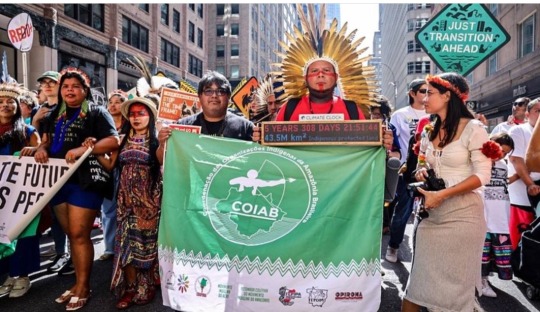
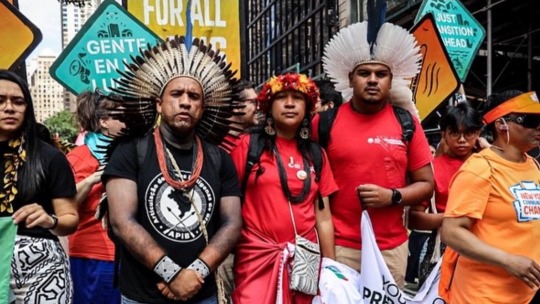
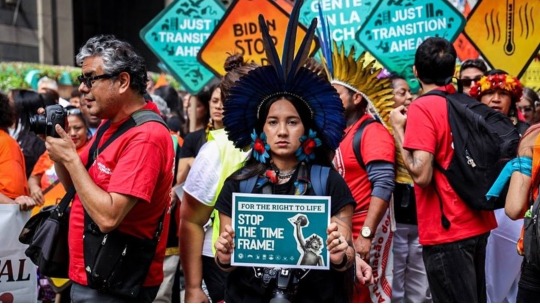
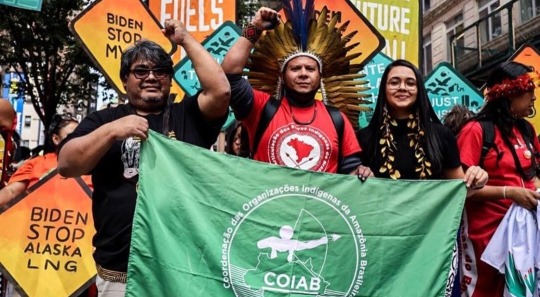
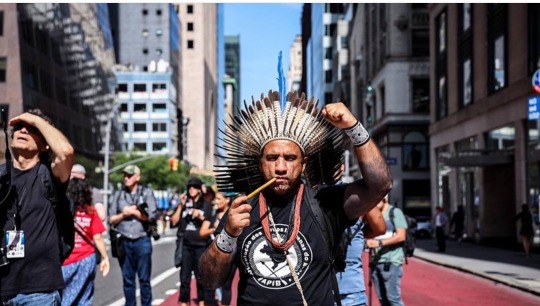
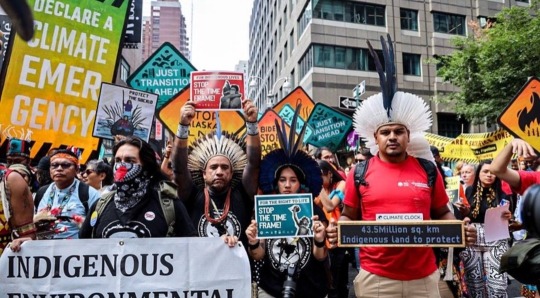
"Trial scheduled for September 20th at the Supreme Federal Court may determine the future of Indigenous Lands in Brazilian territory and be crucial for the global climate. The indigenous movement is mobilizing across Brazil, and an indigenous delegation from Apib is in New York during Climate Week to strengthen the international mobilization campaign in defense of Indigenous Lands rights."
"We are on the land, and the land is within us. If the land dies, we as indigenous peoples die."
The Articulação dos Povos Indígenas do Brasil (Articulation of Indigenous Peoples of Brazil — APIB) is calling for nationwide mobilizations this week and participating in the New York Climate Week to alert the world to the risks of the Supreme Federal Court (STF) judgment scheduled for September 20th. The court will vote on the legitimacy of the legal concept known as the "Temporal Framework," advocated by the Brazilian agribusiness, which could reevaluate Indigenous Land demarcations and impact global climate crisis mitigation efforts.
The Temporal Framework suggests that only indigenous people who can prove they were living on the land in 1988, the same year the Federal Constitution was created, should have rights to the land. This disregards the forced displacements of hundreds of indigenous groups who could only reclaim their traditional lands after Brazil's redemocratization in the late 1980s.
This week, the 15th edition of Climate Week is taking place in New York from September 17th to 24th, alongside the 78th Session of the United Nations General Assembly from September 19th to 23rd, which will feature a speech by President Lula during its opening. A delegation of 10 indigenous leaders is in New York to participate in Climate Week's activities. The international mobilization's goal is to emphasize to the world that the Temporal Framework is a threat to the lives of Brazil's indigenous peoples and could exacerbate the climate crisis, as Indigenous Lands serve as a reservoir of life on the planet.
Apib and its regional organizations are reinforcing mobilizations in territories, cities, and Brasília against the Temporal Framework on September 20th. The goal is to monitor the trial and strengthen the next steps of the indigenous movement's fight. The organizations within Apib mobilized over 220 protests in 21 states, including the Federal District, between May and June.
Five Supreme Federal Court (STF) justices are yet to vote in the trial. The current tally stands at four votes against the Temporal Framework thesis and two in favor. Justices Edson Fachin, Alexandre de Moraes, Cristiano Zanin, and Luís Roberto Barroso have expressed opposition to the agribusiness-backed thesis, while the only favorable votes came from justices appointed by former President Jair Bolsonaro, André Mendonça, and Nunes Marques.
On the same day as the STF vote, the Brazilian Senate attempts to put the Temporal Framework into law. The ruralist caucus in Congress seeks to create tension with the Brazilian judiciary since there is a possibility that the STF may invalidate the Temporal Framework thesis.
In addition to the Temporal Framework, Bill 2903 proposes other setbacks to the rights of indigenous peoples, such as the construction of highways and hydroelectric plants in indigenous territories without free, prior, and informed consent from affected communities. The proposal also aims to allow farmers to enter production contracts with indigenous people, violating the rights of indigenous peoples to the exclusive use of demarcated territories.
While some falsely claim that "there is too much land for too few indigenous people in Brazil," Apib counters that there is too much land for too few farmers and that agribusiness promotes the illegal invasion of indigenous lands. The entity asserts,
"There is no solution to the climate crisis without guaranteeing the rights of indigenous peoples and the demarcation of their territories."
Currently, nearly half of Brazil's land is in the hands of rural producers. Of the total land in the country, 41% corresponds to rural properties, 13.7% to indigenous lands, and 45.2% to other purposes, according to data published in the Official Gazette of the Union. Indigenous Lands are a guarantee of life for indigenous peoples and for all of humanity, which depends on the climate's future.
"As worsening climate crisis unfolds, many will be marked in history as accomplices to the new colonialism threatening the survival of us, indigenous peoples who inhabit the vast territory known as Brazil, and the future of all humanity because there is no solution to the climate crisis without the involvement of indigenous peoples," emphasizes Dinamam Tuxá.
Key activities of Apib during the 15th edition of Climate Week from September 17th to 24th:
On September 17th, Apib participated in the Climate Week march through the streets of New York in support of the Fight Fossil Fuel Strike. The indigenous delegation from Apib denounced the threat posed by the Temporal Framework thesis, highlighted the indigenous emergency situation concerning extractive industries and agribusiness that lead to multiple instances of violence in our territories. Additionally, as part of the Climate Week agenda, it's worth noting that Apib's executive coordinators Kleber Karipuna, Dinamam Tuxá, and other members of the indigenous delegation will participate in a talk on September 19th titled "FCLP: Rights, Participation, and Benefits for Indigenous Peoples and Local Communities in Forest Climate Financing," organized by the Forest and Climate Leaders Partnership. On September 22nd, a portion of the delegation will be present at a dialogue co-organized with H.E Razan Al Mubarak, the current president of the International Union for Conservation of Nature, to assess progress in the COP28 agenda with the aim of collectively identifying meaningful and respectful ways for Indigenous Peoples to engage in the COP.
About APIB
The Articulation of Indigenous Peoples of Brazil (Apib) is a nationally recognized entity within the indigenous movement in Brazil, created from the grassroots up. It brings together seven regional indigenous organizations (Apoinme, ArpinSudeste, ArpinSul, Aty Guasu, Conselho Terena, Coaib, and Comissão Guarani Yvyrupa) and was founded with the purpose of strengthening the unity of our peoples, fostering coordination among different regions and indigenous organizations across the country, as well as mobilizing indigenous peoples and organizations against threats and infringements on indigenous rights.
Support/donate to APIB
APIB Instagram page
APIB Website
#yara.txt#brasil#brazil#latin america#america latina#south america#brazilian politics#brazilian indigenous people#indigenous people#indigenous#native american#native women#first nations#ndn#ndn tag#ndn tumblr#latinoamerica#environmentalism#climate crisis#climate emergency#nature#naturism#naturist#anti capitalism#capitalism#anti colonialism#anti colonization#colonialism#colonization#neocolonialism
187 notes
·
View notes
Note
Even with the confirmation of Echo's origins being placed in Vulture City, Arizona instead of Echo, Utah, where do your thoughts on the town's state lie? Is it in either or? both? a fictional state? I personally like to think Echo exists in the regal state of Utarizona
To be honest, I always found the idea that the town of Echo in Echo VN being placed in Utah simply based on the irl town of Echo also being placed in Utah to be a very weak piece of evidence. If there was more pointing to Utah, then I'd be fine with saying that Echo VN's town of the same name is set within that state.
However—as you can guess—I am certainly not fine with saying that. I have been an Arizona-placed Echo believer ever since I read the vn for the first time, as there is simply more pointing towards that being the case. To begin, the world of Echo VN is set in a very similar world to our own, with the layout and history being almost identical but with the main difference (besides anthropomorphic animals) being altered names: The United States of America is known as The United States of Columbia; Mexico is Sonora; The Netherlands is Batavia; Southland is Australia, etc. While this may suggest some large alternate history things going on, there isn't anything suggesting that these aren't simply just name changes. It is safer to assume that things happened in the Echo world identically to how they happened in our own—with the addition of Emma County and the town of Echo of course as this town is completely fictional.
With that said, one of the bigger pieces of evidence from Echo VN suggesting an Arizona placement over a placement in Utah is the Meseta Tribe and the town's proximity to their reservation. This Indigenous tribe is loosely based on the real life Native American Navajo people; With the Begay surname being derived directly from the Navajo word biye' (which I believe means "son" as in "the son of" but I do not speak the Navajo language so take my words with a grain of salt.) We know that Echo is located rather close to the Meseta Reservation as in Echo VN the town is close enough to drive to and back and not be considered a major trip. Furthermore, a fan-made map (pictured below) was later endorsed by McSkinny and Howly as an accurate layout of Echo and the surrounding area; To the point of even being used as the basis for a map that appears in The Smoke Room. If this is similar to the vision of the authors, then we can say that Echo is placed just to the west (and slightly south of the larger area) of the Meseta Tribe Reservation.
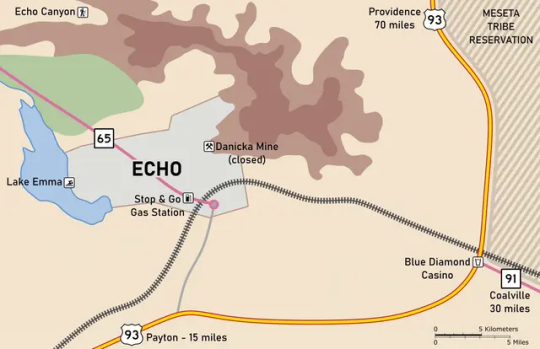
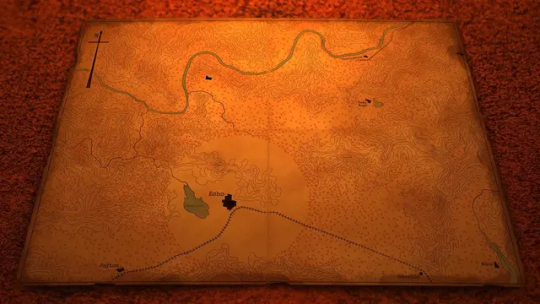
Now when comparing this to the real life Navajo Nation, while there are parts of it that are placed within the borders of Utah, an overwhelming majority can be found further south; If the layout and general size of the Meseta reservation is identical to that of the Navajo Nation—which again can be assumed through the general trend of "everything is the same but with furries and different names"— then for Echo to be placed to the west and slightly south of the reservation, it would be most definitely be located in northern/central Arizona.
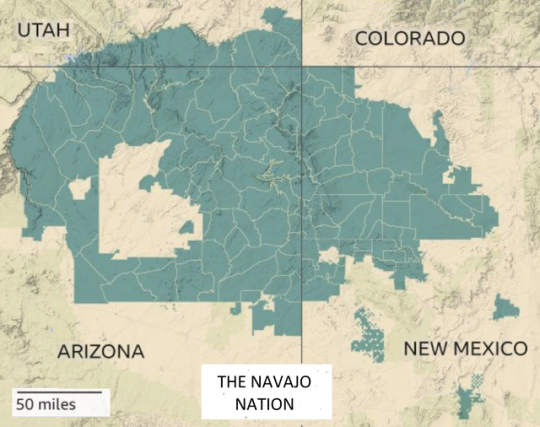
Now, there are some places in Utah in which Echo could be placed for this to make sense. However I think it is much more likely to be to the west/southwest of the significantly larger area set in Arizona than the smaller, northern most bit of the reservation in Utah.
But maybe this doesn't mean anything. Could there be anything else suggesting an Arizona placement? Well, yes!
There are several statements about the ecology of the area surrounding Echo, including direct mentions of plants such as mesquite, saguaro cactus, and brittle-brush shrubs. Now all of these can be found across the southwestern US, however typically these plants don't overlap in natural habitat except for the central Arizona/New Mexico area. In fact, saguaro cactus simply does not grow in Utah at all. In a similar vein, Arches mentions the area being well known for its monsoon season. Which is centralized on Arizona and New Mexico; although again, Utah can and does get monsoons as well, though not as much as its southern neighbor. And for Echo to be in a location that is widely known for monsoons, I personally think it makes more sense for it to be in the hot-spot for such a thing rather than a location in which monsoons are a bit more rare.
Now, whether any of this means anything to you is out of my control; But I personally see all of this and think that Arizona makes the most sense, even without the Vulture City inspiration reveal and the writers saying that they like to think Arizona because "the desert looks nicer there".
What you believe is ultimately up to you; whether that be Arizona, Utah, a combined state of the two, or some curve-ball answer like New Mexico. But my own viewpoint is that Echo is in Arizona.
#Khris Caws#Echo VN#Echo Project#I love thinking about stuff like this. It's so fun.#this doesn't rule out a utah placement though. feel free to believe that utah enjoyers
30 notes
·
View notes
Text

Are Cowbirds Invasive?
(Originally published on my website at https://rebeccalexa.com/are-cowbirds-invasive/)
When discussing invasive species, we often think of species that evolved far away on other continents. Here in the United States, thousands of non-native species have been brought here since the dawn of colonization; while not all became established, a significant number have since become aggressively integrated into local habitats, much to the detriment of native species they displace or otherwise harm. But sometimes a species will simply encroach upon an ecosystem adjacent to its native home, and then spreads from there, having the same negative impact as other relatively new arrivals. Which begs the question: are birds on the move like barred owls (Strix varia) and cowbirds invasive?
I want to especially look at the brown-headed cowbird (Molothrus ater). Like the barred owl, these chunky songbirds have expanded their range in North America in recent decades due to the extensive damage we’ve done to habitats across the continent. Both were particularly affected by the destruction of the Great Plains. Settlers tore up the ancient grasslands with plows, suppressed fires that had kept forests from encroaching, and started a trend of afforestation–planting trees where they aren’t supposed to be–that continues today. In the latter half of the 19th century, the plains bison (Bison bison bison) was slaughtered almost to extinction to make money off the sale of their remains, and to disempower indigenous communities throughout the region who were reliant on this keystone species for their very existence.
The owls hopscotched across the growing number of tree plantations that dotted first settlements, then towns, then sprawling suburbs and cities, and thus were able to reach all the way to the west coast, where they have put serious competitive pressure on the northern spotted owl. The cowbirds, on the other hand, became refugees as all but the last few hundred bison disappeared from the landscape. They instead turned to domestic livestock like cattle for their survival.
(Read the rest under the cut.)
Same Habits, Different Hosts
Brown-headed cowbirds are unusual in that they evolved to migrate with the bison, rather than waiting for new herds to arrive. The birds feed on insects stirred up by the herd’s hooves, along with seeds of grasses and other plants along the way. Cowbirds perching on the backs of these enormous mammals would have been a common sight prior to the bison’s near-extermination, and today they may still be seen watching for prey from on top of cattle, horses and other domestic livestock.
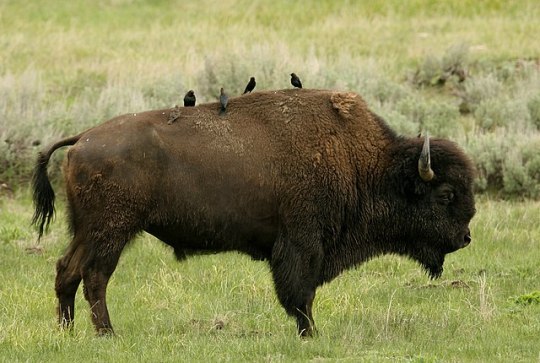
Because cowbirds have spent thousands of years migrating with their bison hosts, they couldn’t afford to settle in one place for months at a time to raise a nest of chicks, particularly as spring and summer would be prime time for finding insects to eat. It might be weeks or even months before a herd would return to a given area, and without the help of the bison the cowbirds would have had a difficult time finding enough insects on their own, let alone for a hungry nest of babies.
So the cowbirds evolved a rather controversial strategy: brood parasitism. Instead of building their own nest, they find someone else’s and leave a few eggs there for the unwitting owners to raise. Some people anthropomorphize the cowbirds as being “bad”, “lazy”, “evil”, and so forth. And, of course, it’s easy to call cowbirds invasive, too, since they literally invade the nests of other animals.
But nature is amoral; there are no inherently good or evil animals. While we may project our distaste for the cowbirds’ practices onto their value as a species, brood parasitism is simply one of a plethora of strategies animals have evolved in order to pass their genes on to the next generation. If it gets the job done, then it is an evolutionary success. Like the mate cannibalism of some mantids and spiders or animal infanticide practiced by male lions, baboons, and dolphins, brood parasitism may be vicious by our standards, but it is a legitimate survival tactic in the sometimes-cutthroat world of nature.
Are Cowbirds Invasive?
We can certainly call cowbirds invasive when they hop into a nest they didn’t build just to drop off an egg. But are they invasive on a more widespread level? Arguably yes. Not all invasive species were physically transported by humans, but the impact is the same: they have a deleterious effect on one or more other species in their habitat. And unlike coyotes, which only spread to new horizons when their competitors were extirpated by human hunters, brown-headed cowbirds are not filling a niche that was previously taken by another species. they are, instead, an often-unwanted addition to local ecology.
In addition to tearing up the Great Plains and then planting trees there, we also cut down massive numbers of trees in historically forested areas across the continent, leaving patches of fields in which cattle and other livestock graze. This has led to the spread of the cowbird beyond its normal range in the prairies. Other bird species that evolved alongside the cowbirds have developed ways to respond to brood parasitism, from throwing cowbird eggs out of the nest, to building a new nest entirely.
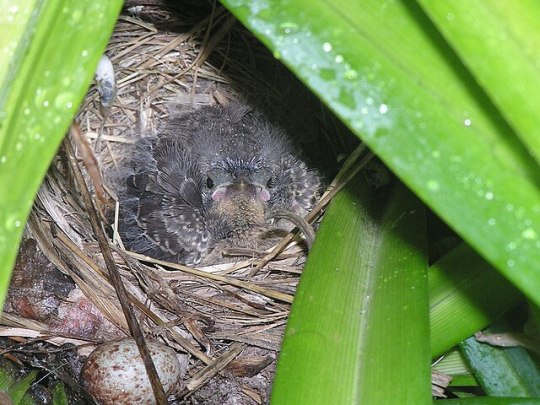
A young cowbird sits in a sparrow’s nest. Note the sparrow egg in the lower left corner that has been pushed out of the nest.
But birds in the cowbird’s expanded territory aren’t always so savvy. That includes species that have seen declining numbers in recent decades due to habitat loss, lead and other toxins, and predation by another invasive species, the domestic cat (Felis catus). Since cowbirds and their chicks will both remove their hosts’ eggs from a parasitized nest, and cowbird chicks may toss their host’s young out or steal all their food, this means fewer numbers of the host species being successfully hatched and fledged. All of which means cowbirds are becoming a serious conservation concern.
That being said, we shouldn’t be too quick to dismiss an entire species by calling all cowbirds invasive. Within their native range in the Great Plains, they are an important part of local ecology. And–unlike certain members of our own species–they are not intentionally cruel animals that want to see other living beings suffer. They are simply doing what their ancestors have done for thousands upon thousands of years, and unlike humans they have no capacity to consider the impact on their hosts.
One last note: if you are tempted to remove cowbird eggs from a nest, please don’t. First, it’s an activity best carried out by professionals who have a better sense of what nests should be attended to and when. Moreover, egg removal can not only cause the host birds to abandon their nest and their own eggs, but cowbirds are more likely to attack hosts who remove the offending eggs, and you could be setting the nesting pair up for retaliation from the cowbirds. And brown-headed cowbirds, like almost all native birds in the United States, are protected by the Migratory Bird Treaty Act, which makes it a federal offense to disturb or harm the birds themselves, as well as their eggs or nests. If you are in an area where cowbirds are considered to be invasive, and you are concerned about another species’ nests, contact your state wildlife department or the closest Audubon Society (some of these societies have changed their names in recent years, but fulfills the same roles as before.)
Did you enjoy this post? Consider taking one of my online foraging and natural history classes or hiring me for a guided nature tour, checking out my other articles, or picking up a paperback or ebook I’ve written! You can even buy me a coffee here!
#cowbirds#birds#birdblr#nature#wildlife#animals#ecology#environment#science#conservation#scicomm#invasive species#endangered species#extinction#bison#barred owls#owls#animal behavior#brood parasitism#parasites
25 notes
·
View notes